#only things with quotation marks are actual quotes
Photo
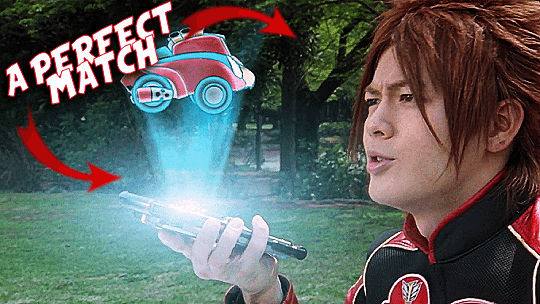
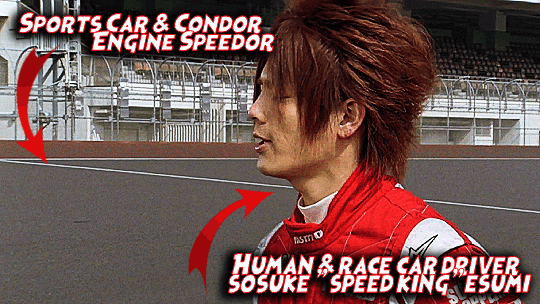
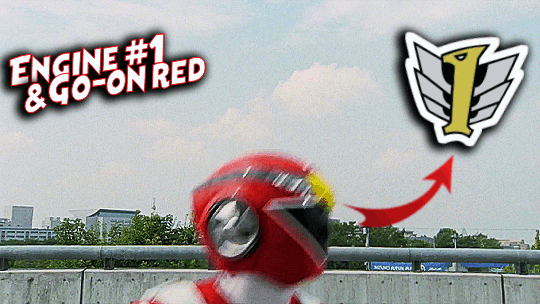
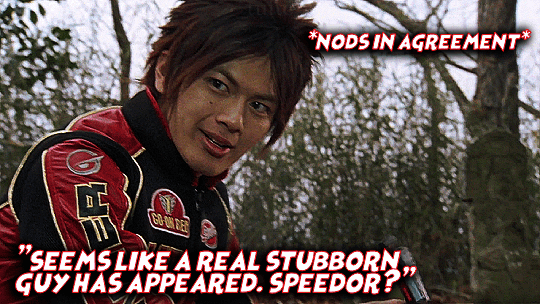
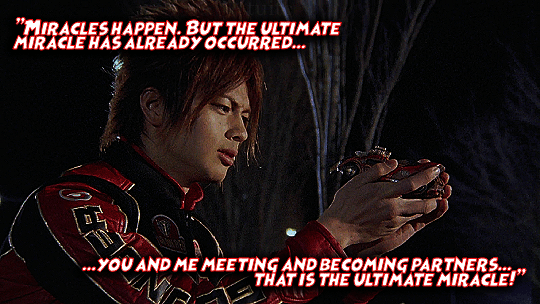
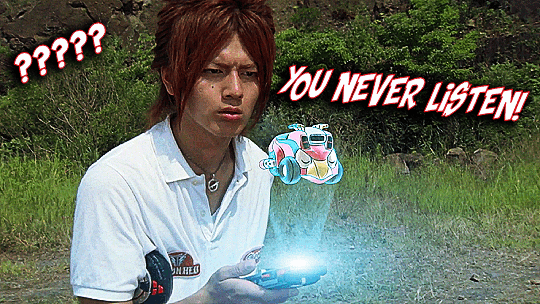
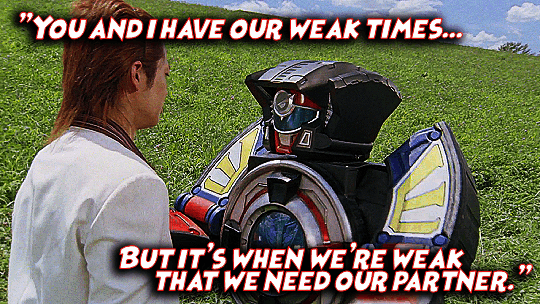
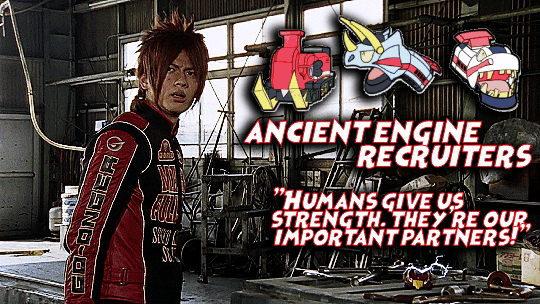
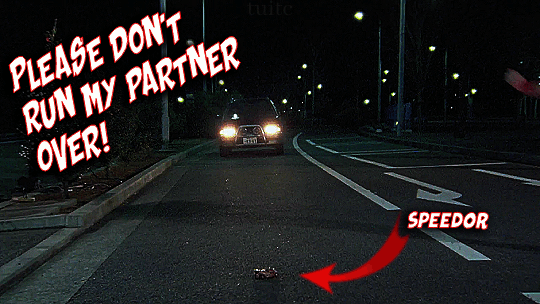
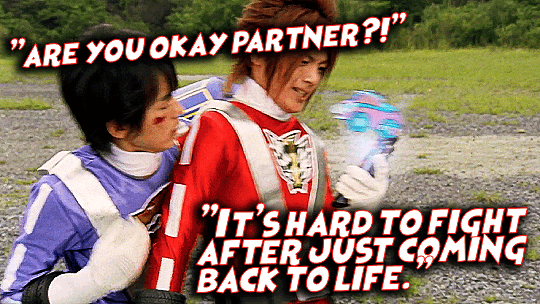
You're My Important Partner→Sōsuke Esumi & Speedor
#engine sentai go-onger#engine sentai go onger#go onger#go-onger#go-on red#go on red#esumi sosuke#sosuke esumi#speedor#tokuedit#please do not repost#umbrella.edits#umbrella.gifs#umbrella.posts#gifs.ymip#super sentai#translation for quotes: ga-earthly#only things with quotation marks are actual quotes#i was going to post these sets with just plain gifs but i didn't like it#so i went through to edit the gifs to make the set more fun
51 notes
·
View notes
Note
Will you write an in depth detail or summary of the midorikawa talk show?
Hello hello! Thank you for this request! Certainly!
They discussed the chapters one by one from 7-1 to 7-7 (and a little mention of 7-8), but this blog pretends that content not released on EN does not exist 💦 So here is the topics from the video from the beginning through 7-4! ^^
An interesting revelation was that it seems the VAs have actually been told very little about the direction of the story 👀 Midorikawa says multiple times that he'd had no idea that this is where Book 7 was going!
*Note: everything outside of quotation marks is only paraphrased from the conversations between Kato Kazuki (Malleus) and Midorikawa Hikaru (Lilia) and is not literal quotes.
Opening
・They compared guest rooms.
・Kato’s has a kitchen area and living rooms, a mix of various dorms and holiday furniture.
・The 1st floor of Midorikawa's guest room is Ignihyde themed, and the 2nd floor is Diasomnia themed. He is proud of having all their tsums.
・Kato says he will update his room for when they meet next time. Midorikawa says he’ll be reminding him.

7-1
・Everyone was surprised by Lilia’s announcement that he will be leaving the school.
・緑川:「皆、先の話知らないから、誰も。『え?出なくなんの?』俺、別事件で動揺していたからな」
(Midorikawa: “No one knows how the story will go. So I was upset for a different reason than everybody else: ‘I’m not going to be in the game anymore?’”)

・Kato and Midorikawa discuss their favorite flavors of shaved ice: the “basic” flavor of strawberry for Kato, and milk flavor for Midorikawa, which he says is harder to find these days. Kato says that there was a place in front of a public pool when he was a child that sold chocolate milk-flavor shaved ice, but he’s never found it anywhere else.

・They were both surprised by Lilia’s magearm.
・The appearance of Lilia’s general design silhouette: Midorikawa saw it before it was revealed and thought it was very cool.

7-2
・Midorikawa enjoyed the farewell party where Lilia was able to speak with all of the characters, which is so rare.
・緑川:「僕もその後の、リリアの出番的に知らないので…中退しちゃうのか…出番、ぼちぼちなくなるのかな…という、ね」
加藤: 「確かに、先知らないって…不安っすね」
緑川: 「そうそう。知らん。全く…全然知らないからね」
(Midorikawa: "I don't know how things are going to progress, with Lilia's appearances in the story...dropping out of school...I guess his appearances are going to drop off, then...is what I started thinking."
Kato: "That's right, not knowing anything...it's a little nerve-wracking."
Midorikawa: "Exactly. I don't know. At all...I have no idea.")

・Silver is the only one different from the faerie group, he is in a difficult situation.

・Gao Gao Drakon-kun is cute. And they both want one.
・The humming scene. Midorikawa says that he'd thought the game had ended, and Kato explains how hard the humming was as he would run out of breath, so recording took a long time. He had wanted to do his best, since it was such an important point in the story.


・Malleus’ overblot line is directly a line that Maleficent has.
7-3
・And now everyone is asleep. Midorikawa says he is jealous because he does not sleep very well at night.

・They both wanted to know more about the Mickey situation, but that will probably not be for a while. They don’t know anything about the future of the story, but that is the assumption. Meeting Mickey felt like seeing something they’re weren’t supposed to see.

・Malleus’ magic was beyond what they’d imagined.

・Since the previous book’s characters tend to have a role in the next book they had expected Idia staying behind from the farewell party to be how he escaped Malleus, but then he was asleep with everyone else.

・Idia’s parents voiced by veteran actors Tange Sakura and Onosaka Masaya. Mother is adorable.
・Sebek’s dream: Kato says that keeping the balance between Malleus’ voice in his overblotted state and how he speaks in the dream is difficult, and he will often slip into overblot-voice and need to be corrected.
・Cerberus Ortho is a very cool card.

・The forest background from Lilia’s dream was illustrated in the same style as the forest in the original Sleeping Beauty.

7-4
・Midorikawa knew that Lilia was based on a bat from the audition but he was very surprised by the realism of Lilia’s bat mask.
・Midorikawa had no idea about anything to do with Lilia's past. Nothing was mentioned about it in the audition or anything. He’d been told nothing in advance. It was a whole new perspective of the character. If he had been told in the audition then he would’ve understood that they had finally arrived at the part of Lilia’s life, but no one had ever told him anything. And he has so much more dialogue in the dream.

・And Baur appeared—that was a surprise. Midorikawa had had a feeling that his voice actor would be Koyasu Takehito.
(Note: Midorikawa and Koyasu have worked on the same projects very often, with both of them voicing characters in Gundam W, Slayers, Revolutionary Girl Utena, Fushigi Yugi, Weiss Kruez, Shaman King and more.)

83 notes
·
View notes
Note
do you have any tips on writing? i wanna start my own blog and start writing, but im not sure where to start and how to make it sound good.
ofc! i do wanna preface by saying i’m by no means an expert, and when it comes to writing (or any form of creative expression) a lot of it is very subjective, so there’s not really any set standard for your writing to be considered “good” outside of basic writing/grammar rules! that being said, here are some things i do!
first just a few basic rules:
1.) start a new paragraph each time someone different is speaking
e.g. “What’s that?” she asked, tilting her head in the direction of the other room.
He squinted, taking a moment to listen carefully before another dull thud echoed through the door. “Not sure,” he replied. “Let’s check it out.”
2.) when seperating dialogue, don’t capitalize dialogue tags, treat the text in quotations and outside of quotations as if they’re the same sentence. this is one i didn’t learn until quite recently actually…😭
e.g. “Oh my God,” she muttered. “Why are you so difficult?”
The exception to this would be if the dialogue is seperated by a different sentence!
e.g. “Oh my God.” She was clearly fed up, running a hand down her face with a huff. “Why are you so difficult?”
3.) when a character is quoting something within their dialogue, don’t use quotation marks (“”), use apostrophes (‘’)
e.g. “He told me “do what you want”, so I will.” (this is wrong)
“He told me ‘do what you want’, so I will.” (this is right!)
as for writing tips, these are just some things that i personally do when i write! they’re not necessarily the right way to go abt it, so only follow the advice you want! i also talked a bit abt motivation here
include actions w dialogue! this can keep things from getting monotonous (like a constant back and forth of “he said” “she said” with little in between) and can also emphasize what the characters are saying! for example, instead of writing “he replied dismissively” you could say “he replied, giving a dismissive wave of his hand” or instead of “she said in exasperation” you could say “she rolled her eyes as she spoke” just little things like that to enhance the dialogue. ofc, keeping it simple is necessary sometimes so don’t overdo this!
that brings me to another point, adverbs aren’t bad (i use them a lot!) but sometimes what ur trying to say could be better expressed with just one word. it can get a bit repetitive if things are always described like “said awkwardly” “laughed loudly” “touched softly” etc. you might be able to find a word that gets the point across better. for example, “said irritably” could be “huffed”, “walked casually” could be “sauntered”, “smiled brightly” could be “beamed” and so on. but there are plenty of cases where adverbs are super useful so definitely don’t avoid them altogether!! i just try to make sure i dont use a bunch in a row
simple dialogue tags like “said” “asked” “replied” are your friend!! don’t avoid using them just bc they might seem generic hehe esp if you’re substituting them w verbs that are less appropriate simply for the sake of not using “said”
sometimes, you’re better off not including dialogue at all! like the whole premise of “show, don’t tell”, spelling out every last thing for the reader can sometimes work against you. body language and cultivating an atmosphere is key here! if it’s an awkward situation, you could bring up someone averting their eyes, shifting from side to side, playing with their fingers etc. if it’s a serious situation, you could mention their tensed shoulders/facial expression, their jaw clenching, them pulling away when someone tries to touch them etc. that in itself tells a story! but once again, it’s just abt using methods like these at the right times. sometimes, exposition is necessary
if ur writing abt skz, or any muse really, i think including mentions of their features/habits makes it more fun to read! it can help immerse the reader if u bring up traits that capture the character’s essence, or speech patterns that capture their voice. it’s all fictional ofc and just based off our perception of them, but i like to write skz in a way that’s at least somewhat believable in accordance w their personalities! even little things like the way jisung talks through breathy giggles, binnie’s nose scrunches, how minho looks up when he’s thinking, or how jeongin ends his sentences with a cute nod sometimes. and ofc there’s physical details as well like binnie’s chin scar, chan’s dimples, hannie’s cheek mole etc
this one is probably obvious but paragraph breaks are very important!! both to prevent overwhelming the reader with a huge block of words, and for organizing events/building tension! a paragraph never strictly has to be multiple sentences, you can have a single isolated line of text if you want. timing paragraph breaks can be very effective for creating the right vibe! if something intense is happening, putting a break right after a serious action or putting a single line of dialogue on its own can make them stand out and really add to the drama of it all hehe
don’t worry too much abt using the same word multiple times!! it might feel a lil annoying when you have to repeat a word several times in a paragraph but sometimes that’s the only option there is. if you try to replace it w 10 different synonyms instead of just referring to a book as a book, then it might end up sounding even goofier haha…so try not to stress when you feel like you’re overusing a word!
if you want your writing to be more immersive, take all senses into account!! describe more than just the character’s actions—describe sights, smells, sounds, touch, how the characters are feeling, etc!
arguably the biggest piece of advice i could give!! having varied sentence structure/length is one of the most challenging parts of writing in my opinion but so so important. when smth sounds off in your writing, it could very often be bc of the way a sentence is structured, or bc several sentences back to back are similar in length/format, which makes it flow awkwardly. i think making sure ur sentences range from long, detailed ones w several clauses, commas, semicolons, em dashes etc. to short, direct ones keeps the writing engaging! sometimes combining 2 short sentences can make the flow sound better, and sometimes breaking down a long one does the same! it also makes it a lot more effective when you have a sudden short sentence amidst several longer ones, bc there’s a clear shift in tone! generally just try to avoid having an entire paragraph of sentences that go “she did this and then this. then she did this and then this. then she did this and said that.” the variety will work wonders for how it all connects together!
ofc there are some situations where you might be going for a certain feeling or tone w your writing, in which case it can actually be a useful tactic to have repetitive sentence length/structure. maybe you want a scene to feel overwhelming w several long, complex sentences or you want to really drive in an idea by using blunt, disjointed ones. it’s all abt what you hope to achieve w your writing and your personal preference!
i hope this helps!! once again this isn’t the be all end all, so please only follow what you see fit! if you have any other questions let me know, i’m wishing you the best of luck! ^_^
119 notes
·
View notes
Note
I have a feeling you might relate to this or you might have even related this on your blog already, but I was just thinking of that Ghoul quotation water water everywhere and not a drop to drink
I think probably my favourite, maybe ever, quiet point of characterisation in a sort of villainous or Beast love interest is his or her having a poet's soul... whether that is conscious or unconscious romantic meditation. It's like Kylo musing to Rey when he says 'You have that look in your eyes. From the forest. When you called me a monster' I love that sort of wistful observation, especially because it evokes such potent imagery ('when we fought together in the forest and then you marked yourself on my face'). Or more literally something like Ghoul citing a line of literature, even when none around except for Lucy would know what he's referencing, it's for his own arrestment and amusement, this is how he sees/interacts with the world
I guess in that way, it reveals something new about their perspective on the world, even when they're somebody seemingly cut off from it - monstrous, othered, repellent, ugly - when they're able to articulate a certain beauty which other characters may not remark upon. It's sort of covetous in that sense, but I think it also sort of helps explain what might interest them about a Beauty, after all, there's something they long for and value (spiritual, aesthetic, existential beauty).
I thought you might be able to relate 🥰
Oh, totally. And with Cooper and Ben, specifically, which is a parallel I hadn't actually noticed until you've just pointed it out, we're being shown their sensitivity as characters. Not in the sense of being considerate, but that they're aware and alert to beauty and meaning in the world despite currently occupying a narrative role which might make us think they're simply destructive or nihilistic figures. And despite the cynicism they're both ostensibly espousing.
Cooper quotes or alludes to literature practically constantly relative to how little he speaks, always knowing people almost certainly won't understand him, and that's especially fascinating because he didn't make those kinds of references in the flashbacks. We could take this in a whole direction about how he created the Ghoul as a character to shield himself from the things he had to do to survive and is living within a meta-narrative deconstructing the reactionary anti-hero who overtook the white hat sheriff he used to play in his movies. The anti-hero he never wanted to be. He makes allusions because his life has become a story he's telling himself to stay sane. He's his own wry Dickensian narrator making asides to an imagined audience about dramatic irony and social commentary.
And an important part of his presentation to others before the war was painting himself as not sophisticated. Just a cowboy and then just a guy who plays a cowboy in the movies. He wants nothing to do with politics either in an interpersonal or broader sense, and disclaims any pretensions to being savvy despite being in a theoretically powerful position as a rich, well-connected major film star. I think he was genuinely naive, but I also think he often played dumb to avoid social conflict. He was complacent and his image helped him remain complacent. Obviously he was very willing to be confrontational when he saw wrong or injustice right in front of him (he goes after Bud Askins directly to his face about marines getting killed by shitty equipment, he challenges Moldaver when she calls him out), but pre-bombs he mostly uses his empathic perceptiveness and charisma to keep everyone around him happy.
In the wasteland we often see him doing the opposite and deliberately riling people up in order to gather information and assess or eliminate them as threats, but he's also only gotten better at disarming people when he wants to. As a handsome charming film star he pretended not to know anything, as a scary intimidating monster he pretends he knows everything.
What I'm wondering about as far as all this goes is whether Cooper always had a secret nerdy side and read all the classics as a teenager or perhaps while waiting between shots when he was working as a stuntman, or whether he wanted to fit in when he started to make it in Hollywood so tried to become cultured before realising that wasn't what anyone wanted from him. Or if he just spent 200 years alone and read anything he could find as a way to cling to his humanity. We know he was at least a bit intellectually curious before the war, because of his reading and retaining some article about studies on torture.
But YES, him quoting poetry and being so interested and insightful about Lucy, specifically is a huge part of how he's framed as a romantic figure. And he's already by far the most romantic figure in the show. If it were solely about his tragedy, you'd think they would emphasise the contrast between his pre-fallen and post-fallen state by stripping him of his heroic trappings, but they don't. He's actually more romantic post-'curse'.
It also gets me because he's an extremely smart, socially adept person who doesn't let others see him for who he really is both consciously and unconsciously on multiple levels and that layers of identity shit is my crack. He was a profoundly honest man who thought he was simple, but actually he was a glorious maze of contradiction and complexity waiting to happen who has now come into his own as a master manipulator.
#sorry I went off on a bit of a tangent there anon#fallout#cooper howard#but I too love that he won't stop doing this#solely for his own benefit#ghoulcy#season two we need Lucy to be unable to help herself but acknowledge one of his allusions and/or argue with him about a book#imagine if that's how they start talking lol#people have mined this a little in fic but it's such a deep well#the potential dialogue is simply incredible#Ben on the other hand is an out and proud lifelong nerd and academic#complete swot#there is no mystery on that front
24 notes
·
View notes
Text
I keep seeing some misinformation being spread about something Koshi Nakanishi (the director of RE7) brought up years ago, after RE7 was revealed (in regards to Chris and Jill). Since some people keep buying into/spreading misinformation, I'm gonna address it on here.

I've seen this screen shot (and others) showing partial text of something I posted some years ago, being spread on here and even on twitter. Notice how this individual cut off what I said in MY POST?
Here is what was said:

Not sure what the reason was some individual felt the need to cut out the context from my post. Even just looking at what he said itself, the context is STILL present though. HE said SPECIFICALLY THEY received MANY OPINIONS and REQUESTS. This is why it's in its own quotation marks. Comprehension is key. What Nakanishi is saying here, is that FANS have told them things such as, "It's about time to get Chris and Jill married." It's a quote WITHIN his response to what was asked. He's saying THAT'S a REQUEST/OPINION, it's not his own statement. He's mentioning what was requested for the "story of the latest game," which is why the man said he can't say anything about the story of RE7 afterward.
Ask yourself, does it make ANY sense, for him to just randomly say it's about time for them to marry Chris and Jill, when the question and his baseline comments were about the story of RE7 itself, and clearly Chris/Jill (as a duo) were irrelevant to the plot (with Jill only just recently getting a NEW story released -set in 2015- in 2023)? If it was of such urgency, wouldn't it have been established after all these years, let alone back then?
The link again (so people can actually read it/go translate it for themselves)
original text:
――なるほど(笑)。とはいえ本作はナンバリングタイトルですので、ストーリー面に期待されているユーザーさんも多いと思うのですが、その辺りはどうでしょうか。
中西:最新作でのストーリー面へのご意見、ご要望も沢山いただいています。「そろそろクリスとジルを結婚させろ」とかね(笑)。ただ、本作のストーリーについて今言えることはありません……。
some various translations:
Google-

See how it's a QOUTE within his response? *also note how this translation actually points out he LAUGHS after referring to the REQUEST*
yandex-

bing-

Like I made VERY clear, it was FANS being acknowledged for a request to see progression in Jill and Chris's relationship. Just like I was talking about what Takeuchi said when asked about them, and Kobayashi with his RE6 interview, when asked about specific romantically-angled pairings. Guess I may as well address his interview as well.
Hiroyuki Kobayashi (based on several translations people can do themselves with the scanned images), was saying RE was never planned to be a "work" about romance. NOT ONCE does he DENY romance existing anywhere (hell he talks about Leon and Ada having some development). He NEVER said Chris/Jill was STRICTLY a partnership for instance (as some have claimed over the years). What he actually said was in line with Takeuchi's claim about there being sort of a rule (for the scenario writers), on romances in the series--though they OBVIOUSLY still exist. There's a difference between someone saying "we don't focus on romance" and "there is no romance at all."
Kobayashi NEVER even denied there being a romantic aspect to their relationship, if people actually bothered to read the ACTUAL interview (even some messy online translations of the interview scans can give you the gist of it still clearly). He said it's more accurate to call them partners (meaning in the official sense) rather than to call them lovers, because they are not "together" officially. I actually thought it was interesting Death Island, never even referred to them as partners once, and it was just a given they were close and working together again once Jill got back on the field, even with Chris still serving as a captain (shown in the film and stated directly in his bio for the film).
A user (valenfieldc) on gamefaqs gave a translation I saw years ago, that lines up closely with what I got from online translations in recent years-
what producer says are actually these:
Q: About Leon and Ada's relationship in this game, will they finally have a breakthrough or they want to remain this ambiguous, unclear relationship fighting BOWs for another 10 years
A: they will have new development, "change" is the theme of RE6. Leon changed due to the mutated president, Ada changed due to some event, one of the interesting part about this game is how do changed Leon and Ada interact with each other. they also have secrets. anyway, you can look forward to it.
Q:there are some lover-like pairings in this series, eg, ChrisXJill, LeonXAda, which one do you prefer?
A: We never intend to make any romantic relationship in this series, so Chris and Jill are partners more precisely, in RE:R is also this way. If you really have to find a romantic relationship in this series, Claire and Steve in CV 's relationship are more subtle. Players can look forward to Jake and Sherry in RE6.
^He even name dropped Jake/Sherry as the NEW pairing with "romance."
Yandex-


Google-


^All errors aside, you can see the GIST of what he said is very clear either way.
Anyway, the point is, this claim being made about Nakanishi's interview was NOT something anyone at Capcom said THEY needed to do themselves, or confirmation they would be. Love interests can exist as "canon" storytelling, without ever even having them become an "official" item. Things could change someday, who knows, but even married couples in this franchise haven't actually been allowed to be "romantic" either.
Always check sources when available, and be careful with what is being presented as a "fact."

29 notes
·
View notes
Text
"bon"?
TWF 4 SPOILERS// prepare for some slightly disjointed rambling on twf 4
i keep thinking of how "bon" reveals snippets of things we don't know just yet about him, like what exactly "bon" is or if he's a spirit or not. that is to say; if he's a spirit we know.
"bon" introduces himself to susan as a sort of receptionist or caretaker in Wonderland. He's friendly and explains it to her with what seems like genuine care and concern. his voice has a robotic but almost loving quality. he speaks as if he's narrating a storybook.

this is our first hint that "bon" might have once been something else. if he 'would know' about how a spirit doesn't pass on as fast as the body does- is he referring to himself or someone else? there seems to be nobody else in Wonderland other than Susan, himself & Edd and Molly. of course, we only know what we're shown- but what we're told here seems very important, too. so important that "bon" mentions it again later:

he's sympathising with Susan; sharing to make her feel better about it. he could be lying, but i don't think so. "bon" was scared too. we have a confirmation now that "bon" seems to be talking about himself here. or maybe what he was before Susan came around.
there is a notable absence of Jack here. is he in Wonderland? we don't know. but we know that "bon" has been there for a while.
i find it interesting that "bon" is in quotes at all. he is consistently in canon media reffered to with the quotation marks- as if he is something fake or that the name is a lie. It could be that Bon, the rabbit animatronic, is simply the main Bon we should be concerned about- and "bon" is lesser, as he doesn't have anything else but the ability to control Bon. Or maybe "bon" is simply what Bon actually is- that "bon" is the AI within Bon corrupted and warped by circumstance.
Or that he isn't really "bon" at all. that the difference between "bon" and Bon is much more important than quotes can convey. To get floppy with it and start something of a theory- "bon" is eerilly simmilar to Jack in a disjointed, warped kind of way. The shape of the suit in the fog and his height and vague face shape reads just too close to me. I don't think they're the same 'person' but i think "bon" could be trying to mimic Jack. we see him talk to susan in a friendly, familliar manner- and saying things i think raise flags about what could be going on

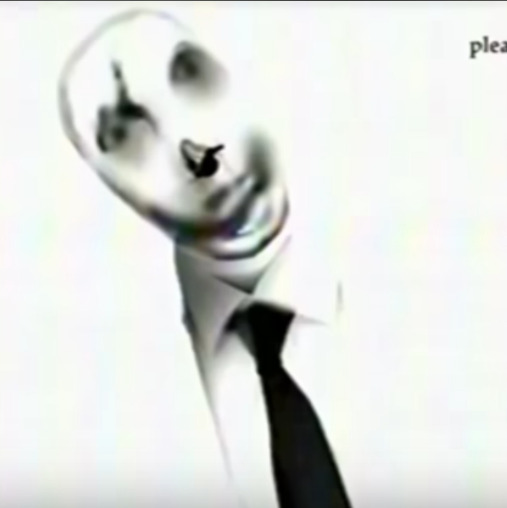
he calls Susan his friend, and says he knows things about her

granted, these could all be learned easilly if we imagine that "bon" has been inhabiting Bon the animatronic for a while, watching people around and learning information to be able to put it to use. or maybe he can't help it- a programmed learning algorithm that keeps learning and learning until it learns everything it isn't supposed to.
I've always had the idea that Bon had something of a computer learning algorithm, a fascinating example of Cyberfun Tech's ingenuity being turned into something wrong and predatory.
The facial recognition AI and walkaround AI we see in twf 4 is very clearly a database and learning AI; we see susan and charles talking about how Banny has to pathfind around objects



this seems pretty clear to me that Banny (and therefore all the other animatronics) are supposed to learn how to recognise objects and pathfind around them for the best possible interaction experience. Banny here, fails the test which according to susan just means they'll have to 'test this out again until we get this right'.
The facial recognition can be altered, too. we see Boozoo recognise Edd and Molly, even though he shouldn't have. I think this is an example of the ghost interferance with the AI actually making it fuction when it shouldn't. What im getting at here; is what did Bon learn?
did he learn that violence we see him enact on Susan? If so, from where? did he witness a murder? see someone brutalize someone else and in his programming, think 'how can i improve this and enact it better?' because getting better, more efficient is what every AI programme in the animatronics aims to do.
the segment where Susan is killed by Bon has a title screen:

'the first', referring to the day Susan died being on the day the first birthday party at Bons Burgers happened. I wonder if it could also be refferring to Susan being perhaps 'The First' to have been killed like this, by Bon and "bon".
this is admittedly pushing it a little but we have like 0 information on Jack atm and i'm not confident Bon killed him. or even "bon". the assumption we are led to make from the episode is that "bon" possessed Bon

and was the force behind Bon killing Susan at all. btw bon makes such a cute pose i really am enamoured by Bon in this episode. But if "bon" is the force behind killing Susan, and perhaps any violence Bon enacts at all; what is "bon"??
we know these things:
-he apparently knows what it's like to be scared [of death? of wonderland? of being a spirit?]
-he knows Susan
-he wears a suit
-he possesses Bon
-Edd and Molly are scared[?] of him
If "bon" is a spirit, like we seem to have been hinted at, is he Jack? Him being in Wonderland before Susan obviously means he must have 'died' before her, but Wonderland is simmilar to 'The Lobby' we see on Anthony's Findjackwalten page here, since 'Alice in Wonderland' REPLACED 'The Lobby' on that page.
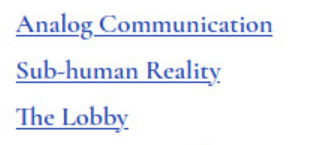

which we know is a purgatory of sorts, from the other Findjackwalten page /ghosthaunt

So if "bon" CANT be only an AI, but died before susan- what if he's both? What if the ghost is also an AI? Could it be that Jack is not mostly possessing Bon, but is in a strange situation where he's fragmented across objects? Jack is most often depicted on a TV or through analog rather than ever being shown with Bon like any other of the animatronics- like susan or charles whose faces are overlaid directly over their suits.
If Jack is split across multiple outlets for his 'spirit', maybe "bon" is actually able to possess Bon because of Jack's spirit- rather than having his own at all. AI and ghost in a sort of terrible parasitic relationship where the AI can use Jack's spirit to exist in Wonderland and the real world in a way it could not before. Think of it a little like possessing a spirit in a weird way.
With this in mind, i think "bon" seems to fit into his politely sinister persona- not threatening, but goal-oriented. "bon" has learned things from Jack and can better replicate him to further his vague goal of. i suppose 'recruiting' spirits to continue to possess their vessels rather than pass on.
#BUT IDK!!!!!! IM BULLSHITTING!!!#im not thinking of any of this as like solid evidence or my heart is set on this btw its just for fun#i like to think#twf#the walten files#the walten files spoiler#the walten files 4 spoilers#meows
48 notes
·
View notes
Text
People are not using pronouns, using wrong words, but I don’t remind anyone verbally. TW: Su1cide, s3lf h4rm, anorex1a mentions.
TLDR at bottom, I appreciate if anyone reads this or has any advice. Other key points in bold.
I’m sorry this is so long, and I promise this is about nonbinary stuff, but there are Complications, if you will:
1. Autistic doormat. (Professionally diagnosed)
2. Anxious and hates confrontation of any kind.
3. Chronic pain that stops me from going places and doing things.
4. Long history of depression, anxiety, s3lf h4rm, su1cide attempts.
5. Speak in a high pitched voice (not natural, forced again by anxiety of being viewed as competent and mature and not having my limitations taken seriously)
6. Have feminine mannerisms.
7. Have a very slight build and feminine features.
8. I have not had IRL friends for ten years, or online friends for about six.
9. Premenstrual dysphoric disorder.
10. Underweight, low key restrictive eating disorder (I will gladly maintain current weight, but comment on my body, eating habits or try to feed me more and the anorex1a says Hello. Also maintaining low weight to avoid “filling out” as much as possible in breast area.)
I’m 25 and nonbinary. I’ve known I was nonbinary since 2014/2015. I had come out verbally to my mom many years ago, maybe around 2017. Came out to brother via a written sign on my door and then a short verbal confirmation in late spring last year. At my high school graduation last year (age 24) I had my write up read aloud by the principal include “I look forward to being my authentic enby self” and I wore a pronoun pin and necklace. My grandparents were also at the ceremony. I reactivated my Facebook account and posted an artistic image and write up explaining my pronouns, name, etc. I have a variety of pride and pronoun items, pins on my backpack, a They/Them pronoun necklace, a keychain. I usually have some sort of sign declaring my pronouns and sometimes my name on my door. I even attended my local Pride parade and festival last August with my mom. Also since coming out I have explored neopronouns and I like to use Ae/Aer for myself.
Now, as mentioned at the very top, I am a doormat. I hate being bother, I have had huge mental and physical health challenges. I always want to help, to do things, I’ve been trapped at home with no pain free or easy way to go into town. I’ve been alone for a very long time, not attending school, and then trying to do it by myself online. I am also AFAB and I generally don’t present in a “gender non-conforming” matter. (Put in quotes because I am not a girl) Just the other night, there was a talking head on the news who’s name was Tiana* and my mom gleefully exclaimed “her name is Tiana*, she has the same name as you! You almost never hear anyone with the name Tiana*!”
ANYWAYS, to the point, I can never manage to bring myself to verbally remind anyone to use my pronouns. I can’t discuss my dysphoria with anyone, including my counsellor, which has really increased in the last few months. My counsellor had to be told what gender dysphoria is, and he’s trying but I don’t feel comfortable talking to him about it. My PMDD is also not only making my mental health in general really mad, but increasing my gender dysphoria. I have tried birth control for this, and it resulted in a suicide attempt.
I came out a year ago now to the wider family network / world, but it feels like everyone has completely ignored that fact. I came out of the closet, but a new, iron maiden style one has been built around me by anyone and everyone who perceives “me.”
I put “me” is quotation marks because it’s not actually me that anyone is seeing or talking to, it’s the mirage of a past person. I just feel so weak and pathetic, I don’t speak up for myself, I just let it happen. I don’t exist, not according to how I am referred to my people the vast majority of the time. They/them does get used at home frequently, but more often it’s my birth name. I’ve gone through waves of uncomfortable indifference to just feeling really shitty, having an abuse of use of that name, where now I am starting to not feel neutral but dislike it. It’s always, “Tiana* this”, and “it’s in Tiana’s* room,” “I think Tiana* has it, don’t you?”
I just feel hopeless. I don’t see myself ever being able to exist as actually myself. If I can’t remind my family in my safe home to use my pronouns; or that I want to use a different name, OR that (body pain permitting) I’d probably like to have my breasts and nipples removed; how am I supposed to reminded anyone else? The massage therapist, the doctor, the other pain specialist, the orthopaedic surgeon, the counsellor, the psychiatrist, the osteopath, anyone and everyone who I’ve ever met before who just, “she/her’s” and “Tiana*’s” me.
*Tiana is not actually my name, it is used for example purposes only.
TLDR: I have a variety of visual objects and signs that describe my pronouns and nonbinary-ness, but I have almost never reminded anyone verbally to use my pronouns and that I am not a girl. The most I can do is squeak out “they” quietly. How can I actually be brave and speak up for myself for once?
#nonbinary#non binary#non-binary#pronouns#neopronouns#gendervoid#gender#transgender#lgbtq#lgbtqia#enby#nb advice#autistic enby#lgbt#trans advice
10 notes
·
View notes
Text
(SPOILERS) The Coffin of Andy and Leyley: Or How I Learned to Stop Worrying and Compartmentalise
C/W: Death, Gore, Cannibalism, Incest
Spoilers for the whole game! If you don't care/haven't played it, I've included a plot summary as it's necessary to follow most of what I'm saying.
Preface
Before anything, I want to clear up some misconceptions you may have about this game. It’s commonly memed about due to the relationship between the two sibling protagonists. I’m not going to argue that there aren’t incestuous undertones (and at a few points, overtones), but I want it to be said that there is a lot more to this game than just cheap shock value.
I’ll admit I picked up this game specifically because it seemed so weird. I’ve always been partial to RPGMaker games (LISA and OMORI are two of my favourite games, ever) and seeing a widely memed about, dialogue heavy indie rpg? Sign me up! Basically, I wanted to see for myself whether the game was actually good, or if its controversial elements carried it to stardom. My conclusion; yup. I don't really have a specific focus here; I mainly just want to cover the various angles of Andrew and Ashley's relationship.
Also, I apologise for the length of the plot summary. I tried my best to shorten it, but there are lots of little moments that I need to specifically reference later. Bear with me.
Key/Explanations
I’ll be using a lot of quotes in this essay. Because many of these are back-and-forths, I decided to clearly identify which character is saying what. So, pink means Ashley, green means Andrew, yellow means Mum. If there is text that has no quotation marks, but is coloured, it’s the characters internal narration. Hope that makes things easier to read!
I mention the Burial and Decay routes on occasion. I’ll elaborate on them here; when you’re preparing the ritual to sacrifice your parents, you can choose to either let Andrew stay with them and set it up, or set it up yourself (as Ashley). Choosing the former results in a conversation between Andrew and Mum, wherein she’ll offer an olive branch. Accepting this results in the Decay route, a route which is characterised by Andrew’s indifference to their future and his coldness towards Ashley. Declining results in the Burial route, wherein Andrew maintains his general composure and his care for Ashley. Also, choosing to set up the ritual as Ashley also results in the Decay route with only some minor dialogue changes and a unique conversation.
I mention Room 302 a few times as well. This is the room where Andrew holds the woman hostage, who he later kills. I bring this up quite a few times, so keep it in mind.
Plot Summary

Andrew and Ashley are two siblings living in an apartment together. They have been quarantined for an indeterminate amount of time due to some parasite they allegedly have and are nearly starving to death. The two hear their neighbour play loud music and they cross the balcony gap to investigate. They witness him performing a satanic ritual, but he fails. They watch some TV before falling asleep. Ashley reminisces in her dreams. She remembers her mum leaving them, a nurse taking their blood, and their mum telling her not to call them anymore. The next day, Ashley decides to clean up the house, but collapses from exhaustion. Andrew takes her to the couch, and while half asleep, she hears him talking to his girlfriend, who dumps him. Some time later, Andrew and Ashley are laying in their living room. They hear their neighbour again, alongside a strange roar. They witness him summon a demon that then kills him. They decide to cannibalise him, transporting his body into their freezer and cooking and eating one of his limbs. Ashley goes to sleep while Andrew cleans up. While dreaming, she recalls a time when she convinced Andrew to bring Nina, a friend of hers who likes him, to a warehouse so they could trap her for a while to scare her away. Andrew is reluctant, but Ashley insists. When Ashley traps Nina in a chest, Andrew tries to convince her to just let her out, but Ashley manipulates him into leaving her there. She’s awoken by Andrew, who can’t sleep, and goes to sleep next to Ashley.
The next day, they return to the cultist's apartment. The warden knocks on the door, and hearing no response, presumes the cultist dead. Andrew goes to distract the warden at their apartment door while Ashley cleans up the blood. When the warden opens the door, Ashley hides in a closet. He finds her, and Andrew kills him. Before they leave, he tells her to never speak of this to anyone, threatening her. Ashley lashes back, and Andrew apologises, telling her he’s stressed. They concoct a plan to escape; try summoning the demon that killed the cultist again, and offer the other warden as a sacrifice. While checking out the floor below them, they encounter a woman in Room 302. Andrew threatens her with the cleaver to call the other warden up to the cultists room. He stays with her while Ashley goes to summon the demon. Ashley is successful and receives a talisman which will give her prophetic visions. She goes back to meet up with Andrew, finding him alone and the woman dead. He tells her that he let the woman go, but she tried to shoot him with a nail gun and so he killed her. Ashley accuses Andrew of trying to sleep with the woman. This causes an argument. which spirals, climaxing when Ashley absolves herself of any wrongdoing and claims Andrew has done everything of his own free will. Andrew threatens to kill her, but Ashley says that she’s the only one he can talk to. The two reconcile with each giving a stipulation. Andrew doesn’t want to be called Andy, and Ashley wants it to be just the two of them. They escape the apartment together.
Some time later, the two are sitting at a cafe. They’ve been living at a motel. Ashley has a vision that night of a hitman killing them both, so she wakes Andrew up and they leave. She decides to wait to ambush the hitman with the gun they stole from the warden. They take everything from their motel room, and Andrew shoots the hitman in a nearby park. They steal his car. Ashley suggests robbing their parents, to which Andrew reluctantly agrees. She says they should kill them as well, which he isn’t keen on. While asleep in the car, Ashley recalls the two finding Nina dead. Ashley is unbothered while Andrew panics. The two go to bury the body, with Ashley blackmailing Andrew into being friends with her, else she tell everyone their secret. Andrew reprimands her, telling her he already liked her. Ashley is awoken in a car park near their parents' home.
They break into their parents' home, finding them to be richer than they remember. When their mum unexpectedly arrives home, Andrew converses with her. He tells her that they’ll cook dinner. They have dinner with their parents, and while cleaning up, Ashley attempts to convince Andrew to sacrifice their parents to recharge the talisman. While asleep on the couch, Andrew has a dream, recalling his relationship with his ex-girlfriend, his cannibalism of the cultist, and the corpses of the people he's killed. Ashley wakes up Andrew on the couch, and they bring their parents to the basement. They summon the demon, presumably killing them. While untying them, Andrew finds them to still be breathing and panics, so Ashley kills them. Ashley notes Andrew's apathy while they clean up. Before they leave, they decide to get another vision. Ashley falls asleep, and either gets a vision recalling her life and her relationship with Andrew (Burial) or is chased by Andrew, who then kills her (Decay). Regardless, the two leave to dump the bones into the ocean.
Codependency


Andrew and Ashley are hopelessly codependent. This is both alluded to (i.e when Andrew’s girlfriend breaks up with him) and made very clear through their dialogue. After they butcher and eat the cultist, Andrew wakes Ashley up because he can’t sleep and sleeps next to her that night, which is implied to be a regular occurrence. Throughout the game, Andrew struggles to cope with his actions and their tumultuous future, often talking out his problems with a relatively unbothered Ashley. After their first argument he tells her “It’s……….. I’m stressed out, Leyley.” and when she gives him the silent treatment in the car, he attempts to apologise but is rebuked. Andrew’s reliance on Ashley to cope with his guilt is something both of them are very aware of: “I’m the only one you can talk to. I’m the only one who can make it go away!” “Fancy that. When you’re the reason I can’t sleep in the first place.”. Andrew has always struggled to say no to his sister; in the past, he was reluctant to trap Nina, and tried to convince Ashley to let her out of the chest. Ashley gets his compliance through emotional manipulation “It’s not fair! Why does everyone like her better? I’m loud and weird and annoying and no one likes me at all!” ”...I like you better LeyLey.” “Prove it. Liar”. This codependency is only furthered when they bury the body; “You’re a bad person Andy. But I won’t tell anyone… So let’s always be friends. Okay?”. Andrew is “stuck” with her (a motif repeated throughout the game). In the present, he is quick to dismiss Ashley’s idealistic plans, pointing out how they can’t stay at their parents house after the murder or use their IDs. However, he still goes along with the majority of her schemes, even if they’re dangerous (i.e killing the hitman). This indicates the level of influence she still has over him; during their argument in Room 302, she insists that “you chose me! YOU CHOSE ME! ME!!”, referring to the Nina incident, which incites Andrew enough to threaten to kill her. His eventual refusal to do so shows us two things; that he still feels intense guilt over Nina’s death, and that he needs Ashley to deal with it.
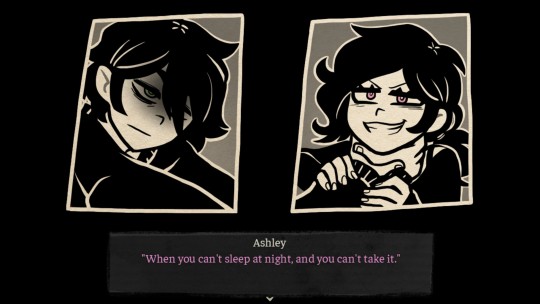
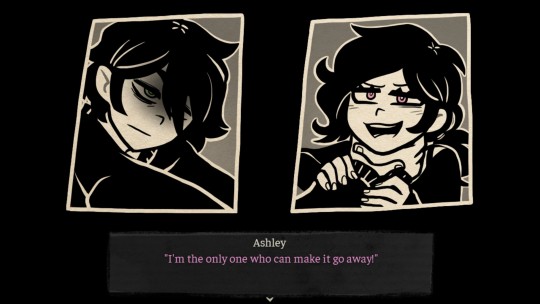
While Ashley is the more assertive of the two, this doesn’t mean she’s any less dependent than Andrew. She’s shown to be incredibly possessive of Andrew (who she prefers to call “Andy”), getting intense jealousy whenever he receives or gives attention to another woman. This is what incites her to trap Nina; “What do I do about these hussies around you…”, as well as sparking the argument in Room 302; “Andrew shoots his load, while I risk getting shot by the warden!”. She even mentions this in the Decay route after they sacrifice their parents; “I don’t know. What do you keep me around for?? I’m certainly no pretty lady. You can’t even fuck me.”. Her contract with Andrew demonstrates this perfectly: “And thus, she forever keeps her mouth shut.” “Only as long as you keep your eyes closed!”. Ashley holds all the power on the surface; she’s the one who can reveal this truth, showing indifference to the truth of Nina’s death being revealed; “So what? “No one likes me anyway.”. But when it comes down to it, she needs Andrew just as much as he needs her. While the emotional manipulation she uses on Andrew is obviously bad, it’s clear that Ashley herself believes what she’s saying; “God! You stupid, stupid girl. I’ve been here this whole time….. None of this needed to happen, you could’ve just–” “I KNOW YOU DON’T LIKE ME!! Andy, I know. But that doesn’t matter anymore. Because from now on, no one will like you either!”. She blackmails Andrew because she genuinely believes this is the only way to get him to like her, ignoring his complaints. The current Ashley is certainly more deliberately manipulative than her past self, but as we see with her stipulation, Andrew’s undivided attention is still the most important thing to her. There is no Leyley without Andy.
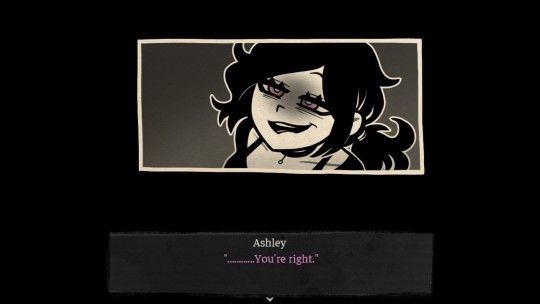


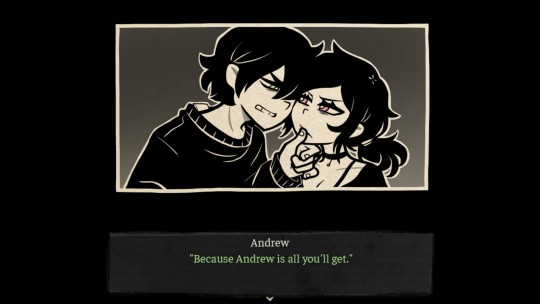
Idealisation


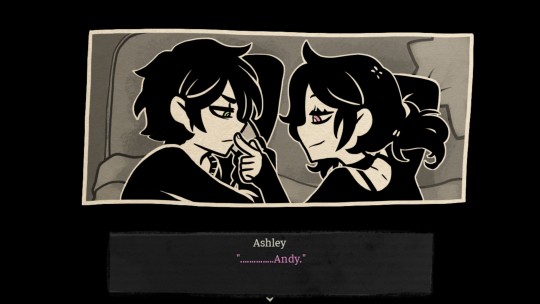
“Andy” and “Leyley” are more than just nicknames; they are used by the siblings to refer to distinct versions of themselves. This difference is most pronounced in Andrew; whenever we see the two in flashbacks, they are “Andy” and “Leyley” but Andrew is quick to show his disdain for the nickname whenever Ashley tries to call him it. After killing the warden, he decides to play along, but when they leave the apartment, his one stipulation is that she never calls him “Andy” again (which she deliberately breaks again and again). In his own words, “Okay, but I’m not gonna be Andy anymore. He’s so… spineless. And I hate Leyley like you wouldn’t believe… She better stay and die here with Andy. So you and I can leave.”. Andrew associates “Andy” with a prior version of himself; calling him “spineless” implies that he intends to stand up to Ashley more than he did in the past, and he makes it clear that to him, there is a clear distinction between the two and their nicknames. When she calls him Andy in the motel, he responds with “Go for it! Though you’re going to find me a lot less accommodating than Andy.”. This is what sparks their big argument in the car; “Oh c’mon! It’s just a joke.” “Like I don’t know you Ashley! You’ve pulled this shit before… You’ll keep going “Andy “Andy” until I get tired of correcting you. And suddenly it’s “Andy and Leyley and Stupid Bullshit” all over again.”. He confronts her again while they’re washing the dishes at their parent’s house; “I agreed to behave, and you agreed it’s just us now.” “Funny. Because I remember agreeing to bury Andy and Leyley.”. Andrew wants to use their new life on the run as a fresh start of sorts; to be a different, better version of himself. But Ashley doesn’t.
Ashley is naturally opposed to Andrew’s stance. She adores “Andy”, not just the nickname, but the ideal of Andy. Of the brother who loves her more than anyone else, who helps her out whenever she needs it, who agrees with her no matter what. While Andrew tries to push himself away from this mould, Ashley wants him to stay firmly within it. This dynamic has existed for some time prior to the events of the game; “I told you to stop calling me that. We’re not kids anymore.”. Despite agreeing to his stipulation, she continually pushes his boundaries, trying to slip it into conversation like in the motel (which he instantly rebukes) and later into the conversation during dinner with their parents. She wants Andrew to be just like they were when they were kids, when they were doing their “Andy and Leyley” adventures. It’s no coincidence that after they eat the cultist (the inciting incident), Ashley reminds Andrew of their past; “Hey Andy? Remember when we used to go on adventures. Andy and Leyley’s quest for something-or-another. Remember?” “W-why bring this up…?” “Isn’t this just another one of those?”. She’s still treating everything like just another adventure, which gets on Andrew’s nerves after he kills the warden; “Ashley. I am not in the mood for your shit right now.”. While washing dishes, Andrew asserts that “Well guess what? Andy is dead.” with Ashley responding that “..... You’re right. I really don’t like Andrew.”. Andrew wants to bury Andy, while Ashley wants him to be Andy forever. But what she can’t (or won’t) understand is that there is no Andy. Not like she wants.
Desensitisation
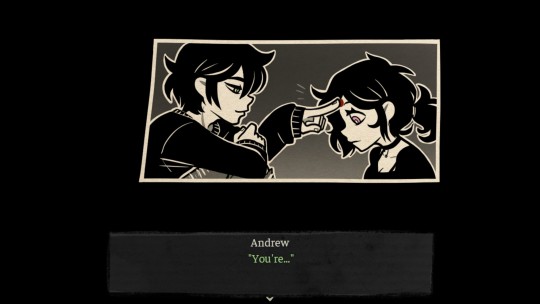


Throughout the game, Andrew slowly gets more and more desensitised to both his and Ashley’s actions. He’s careful by nature, and quick to panic when things get out of control. He retches when eating the cultist, and struggles to sleep that night. But as time goes on, as more people die, he starts to lose his sense of humanity. In fact, he begins to become more and more like Ashley, something that she notices; I don’t know… something is shifting. I don’t really like it…... What’s interesting is that Ashley doesn’t want Andrew to be like her. No matter what route you take, Ashley picks up on Andrew’s nonchalance when cleaning up their parents' bodies. Andrew continues casually butchering your parents. Incidentally, there’s a knot in your stomach OR “Having regrets?” “Would I be allowed to say so, if I did?” “I love you Andy. I love you. I love you. I love you. I’m sorry for lashing out earlier. I forgot how hard this is for you.” “I’m fine.” “No you’re not, talk to me.” “………. I’ve got nothing to say to you”. Andrew continues casually butchering your parents. And for the first time in forever, you have no idea what he’s thinking. During his vision in the Burial route, we see his ex-girlfriend Julia. Andrew says that; “You’ll never see her again. And the fact that it doesn’t really bother you, bothers you”. Andrew isn’t just becoming desensitised to murder and cannibalism, he’s becoming desensitised to everything, as demonstrated by his nonchalance at the bridge. Ashley later shows relief when Andrew can’t sleep; “Oh, you still can’t sleep? For a moment there I thought you’d changed.”, followed up by his eulogy at the bridge where she wonders Maybe you have changed after all…. Meanwhile, in the Decay route, after she has the vision of Andrew murdering her, she calls him Andy and hopes that he doesn’t react. He initially doesn’t but when she asks why he doesn’t say “I love you” back, he says: “You keep calling me by some other guy’s name. What do you expect?”. This is the natural consequence of Ashley’s desire for her Andy; as Andrew goes along with her plans, he becomes less like the Andy she wants. These incredibly stressful situations either result in him snapping (Room 302) or no longer caring (their parents). And these exact situations cause the only thing keeping him together to fracture and tear.
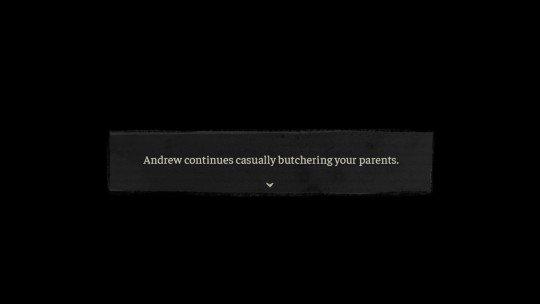

Responsibility


No matter what seems to happen, Andrew tries to maintain some form of a moral compass. He tries to justify his cannibalism to Ashley: “I was too hungry to think straight, okay??”. But as Ashley points out, whether he feels bad about it or not, he did it. “What do you want me to do about it? Woosh woosh! there goes my magic wand! There. I’ve absolved you of your sins! You never took a bite now.”. This is Andrew’s most potent coping mechanism, the one thing that seems to keep him sane despite everything; no matter what, he is not fully responsible for what he’s done. When they argue in Room 302, he denies Ashley’s innocence; “I’m all innocent. I’ve not harmed a single soul!” “Of course not! YOU MAKE ME DO IT FOR YOU!!”. While this allows him to maintain some composure, the obvious guilt he carries reveals his true feelings; he is aware of what he’s done and what it means. But he maintains that fragile defence, the last thing that he needs to hold on to not to lose himself; part of their twisted, complex relationship is that Andrew needs Ashley to share the blame. But it’s a ticking time bomb. The big turning point for when he seems to fully accept his responsibility, is after they sacrifice their parents. They are revealed to still be breathing, causing Andrew to panic, but Ashley kills them. And she catches something; “Surely, he’ll bitch and moan as per usual. But you did not miss that sigh of relief”. Relief at the death of his parents. Until now, Andrew always had a defence for his murders, as we see in his dream; You killed this one to protect Ashley. No regrets.; Ashley would’ve wanted to kill this one anyway. You couldn’t leave any witnesses after all.; This one you had to get before he got you.. But he’s run out of excuses. He nonchalantly hacks away at their bodies and disposes of their remains, something which even Ashley is uncomfortable with. The way he drags his bloody finger down her face is very reminiscent of her doing the same thing when Andrew can’t sleep after they eat the cultist. The roles are deliberately reversed here. Ashley is turning Andrew into a monster. Or maybe he’s letting her.


Neglect

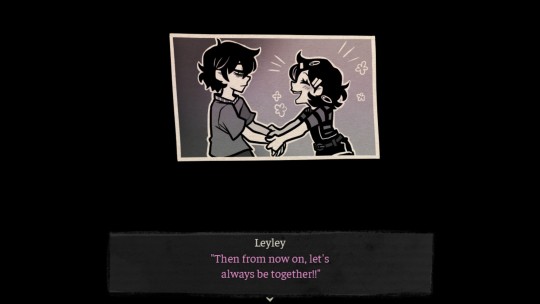
While Andrew is slowly changing, Ashley, on the other hand, was never bothered by the murders, or the cannibalism, or just about anything. We see this in the past too; after Nina dies, she reacts with cold indifference; “If you’re so weak that you die just like that, then clearly nature doesn’t want you to live.”. This brings us into a nature versus nurture argument; was Ashley’s upbringing the cause of her personality, or was it intrinsic to her? To do that, we have to understand why Ashley is so fiercely possessive of Andrew. We don’t see a great deal of their childhood, but we can piece a lot together from short scenes and implications. The game establishes early on that Ashley has a bad relationship with her mum; “Please don’t call me anymore. I won’t answer…………… G-goodbye, Ashley…”. This is expanded upon in the car, when it’s revealed that Andrew knows their parents’ new address; “.... She actually told you the address?? Huh.. the only thing she told me was to stop calling her.”. The conversations Andrew has with their mum makes things very clear; he gets along well enough with her to piss Ashley off; “Hell, since you think everything is all good, why not stay here and play happy family some more??”, and of course, Andrew has to convince her otherwise; “Listen, I chose you, didn’t I? I chose you.”. And in her vision during the Burial route, we see a representation of the events up until this point with plushies. Her parents and Andrew are at the dinner table, while she’s alone in the corner. Even if you try and put her plushie on a chair, it just falls off.

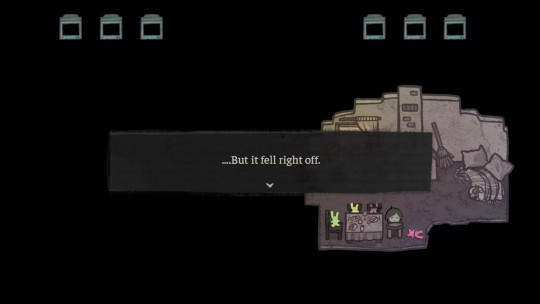
We are given more context in a hidden scene you can find in the Decay route. Ashley finds a present in her vision, which reminds her of one of her birthdays; “Hey Andy? Isn’t it interesting that when it’s your birthday, you have your classmates come over and stuff… But when it’s my birthday, we can never afford anything?”. When Andrew suggests buying a cake, Ashley responds with “Nah… it’s not like my friends would show up anyway…. They’re always busy when I ask for anything. Even when I haven’t said the date yet…”. After Andrew uses his pocket money to buy some lemon muffins, he tells her to wish for something. She wishes that “my brother loses all his friends and never finds love!”. This scene is really, really interesting because of how normal Ashley is in it. She isn’t concocting some scheme, or manipulating Andrew. She’s just a kid who’s sad on her birthday, and looks to her brother to comfort her. It’s for this reason that I think you can view this scene as a turning point of sorts; when Ashley gives up on depending on anyone except Andrew. That’s certainly what her wish suggests. This is further supported by a conversation Andrew has with his mum if Ashley leaves him to set up the ritual; “I wanted to apologise to you. For always making you look after her. That was wrong of me. I’m sorry I made you raise her. I thought you were getting along, so I didn’t want to see what was happening. And for that, I apologise.”. Ashley’s neglect was not incidental, but purposeful; her mum let Andrew deal with her and ignored their growing dependency.

Now we have a much better idea of who Ashley is, and why. Ashley had these almost sociopathic tendencies as a child (as seen with Nina), but blaming her isn’t really fair. Ashley was completely and utterly failed by her parents. Her mum delegated the burden of raising a child to Andrew, while ignoring the worrying signs she developed. If Ashley stays in the basement to set up the ritual, her mum admits she was aware of Nina’s murder; “I never told anyone what you two little psychos did to that girl.”. Their mum is characterised by inaction; she admits she’s a fuck up to Andrew, but it doesn’t change a thing. Ashley’s lack of parental affection and her inability to get along with her peers led to a loneliness that only Andrew could fix. It’s no surprise that her relationship with Andrew developed the way it did. Ashley is a victim of a much subtler form of child abuse, the type that isn’t dramatised or talked about as often, but can be just as devastating. Ashley didn’t have to be a monster.


That’s It?
We’re left at a precipice; these two fundamentally broken people who can only find comfort in each other. Unfortunately, the game isn’t currently finished. We don’t get to see how the branching Burial or Decay routes go, or even how Andy and Leyley’s final adventure ends. But I still think there’s a lot to say about this little RPGMaker game made by one dude. How it examines these complex themes; the toxic nature of codependency, the unhealthy escapism of idealisation. How desensitisation can be inevitable, and how people use mental gymnastics to escape the weight of their actions. And how monsters aren’t born, they’re made, sometimes in more subtle and insidious ways. I think that’s all really worth talking about.
Postface
I haven’t written a structured essay in a long time, so I hope my rustiness didn’t show too badly. I’m not exactly sure why I felt so inclined to write all this about this specific game. It’s definitely a game I really enjoyed, and that strongly affected me emotionally. But I’ve played a decent amount of games like that in the past year or so. Maybe I just played it at a time that I needed some kind of creative outlet. Who knows.
Thanks for bearing with my indulgence.
35 notes
·
View notes
Text
Google Docs vs. Geoffrey Chaucer
A while back, just for fun, I pitted Google Docs's fancy new (read: hilariously inept) machine-learning spellchecker against a chapter of my dissertation that contained a lot of quotations from Le Morte Darthur:
At the time I suggested I might go back and do the same with the chapters that included substantial quotation from the Canterbury Tales and (shudder) Piers Plowman... and today I find myself with little better to do, so let's give it a go. Below the cut.

Extremely helpful there, thanks. For the curious, gilofre is a plant; in Modern English it's gillyflower. Clowe is just "clove". "Clowe-galofre" is nowhere on Google or in the OED, but it seems "Galofre" is an attested surname, so Google thinks maybe that's what I meant.

Fascinating choices here. That is of course meant to be nutmeg, and Google Docs has seemingly decided that putting in a space to turn one misspelled word into two words, one of which is spelled correctly, is a positive development. That or this is a continuation of the previously-observed trend that Google turns things into brands and corporation as much as possible -- apparently there is a company called "Emuge-Franken", which is the only result for "emuge" on Google Search.
It hasn't gotten anything right so far, by the way -- all those red underlines I haven't screenshotted anything for, it either suggests a word that is wrong but unremarkably so, or fails to suggest anything.

(Never mind, it got a couple right in between the last one and this one.)
This is interesting in that it shows Google Docs interprets things differently based on capitalization. This instance of bityde is capitalized because it's at the beginning of the line; the other one in the phrase bityde what bityde, which isn't capitalized, Google is able to correctly interpret as "betide". However, it seems to think the first is a proper noun and makes different suggestions. (Blyde is the Afrikaans name of the Motlatse River in South Africa, it would seem.)

I am reluctantly forced to hand it to Google Docs with this one. Like, no, that's not what Chaucer meant of course, but I can respect the shot being taken. Also interesting that it gets the blue underline because you can't really spell a transliteration wrong, but that's not how the system we normally use renders it. Not sure why spere "spear" (Google suggests "sphere") and vestiments "vestments" (Google gets this one right) are also marked as blue (style/grammar) rather than red (spelling), though.

... and now I'm taking what I just handed to Google Docs back away. WTF is this? Why...? you know what, we're moving on.

Bafflingly, Google thinks there is nothing at all unusual about that first line. Yep, that's normal Modern English there.

And here's our first example in this post of Google Docs trying to suggest a spelling that is also in Middle English, because I very much suspect the data it uses has been contaminated. Actually, come to think, if their machine learning system bases its judgments on what other users write rather than the old system with a set dictionary, I bet all the people writing papers about pre-standardized-spelling English literature are really screwing up the data. Which is hilarious -- if true, that would mean that I'm actually part of the problem for writing this whole dissertation full of Middle English quotes in Google Docs.

You might think this is another example of the same, but in fact the change from -ioun to -ion makes that suspect, and the Middle English Dictionary doesn't recognize it without the <u>. And if you Google Refleccion, all the results are in Spanish. However, I can't seem to find it in a Spanish-English dictionary, and those same dictionaries tell me the Spanish for reflection is reflexion -- maybe this is a variant spelling? I only have basic high-school Spanish to draw on here, so if any of my followers are fluent and can explain refleccion to me, I would be interested to learn.

Hm... no, that's not right either. Although a quick Google search tells me that there is a YA book called Physik, so that's probably what's screwing up this one. Probably not ideal for that sort of thing to happen.

And this one, it seems, is French. (Again, according to the Middle English Dictionary, all the attested Middle English spellings have the <u> -- but the French cognate is in fact spelled just like Google suggests, as far as I can tell. I don't speak French at all, though, so grain of salt.) I wonder how that happened -- do non-English words just kind of drift into the machine-learning system's vocabulary? Possibly through the same mechanism I speculated about with the Middle English above -- i.e., people write documents that are mostly in English, but contain some quotations or something in other languages, and if that happens enough, Google starts to think it's an English word?
Wait, is that maybe what's screwing a lot of this up? Either Google's system is going "This document is in English, so all the words in it are English words" and thus stuff just keeps bleeding between languages and screwing up the dictionary, OR Google's system is just kind of language-agnostic and sees no issue with suggesting French words in a document that's mostly in English? Is this why there are so many words that aren't correct Modern English spelling, but which Google Docs doesn't mark wrong? Like, they happen to line up with words in other languages, so Google just thinks you're borrowing really haphazardly throughout?
Also, side note, it tried to correct "hir" to "hirt", which is not an English word, but apparently stands for High Impact Resistance Training. Moving on.

Shenden is a Middle English verb that basically means "to damage or destroy". You don't really see it much in Modern English, though the OED has a couple examples of 20th-century usage. Anyway, I thought this was another case of Google bringing in different Middle English words, but a quick search tells me "Sente" is a skincare brand. That's probably more relevant.

Google Docs again just ignoring whole lines.

Odd choice there, sight being closer than site in terms of spelling. Maybe the algorithm assumes that if you end with an <e> you probably mean the second one.

Interesting, Google Docs. Why do you think that should be "night"? (Oddly, it actually gets all the red-underlined words in this line correct, meaning it pretty much has the context of the word.) Somewhat weird suggestion there.
I'm about a quarter of the way through the document and I think this is long enough for now; I'll probably come back and reblog with additions later. Before I go, however, here are my lists of "things spellcheck should be able to fix but can't" from what I've gone through so far.
First, spellings that differ from Modern English by only one letter, but which completely stump Google Docs (i.e., it marks them wrong but only gives the "why am I not seeing a suggestion?" message):
Goute ("gout")
Herbes ("herbs")
Melodye ("melody")
Smale ("small")
Swete ("sweet")
Syde ("side")
Ther ("there")
Wel ("well")
And second, words that are not correct in Modern English but that Google Docs does not mark wrong:
Anoon ("anon")
Attempree ("a temperate")
Beautee ("beauty")
Bowle ("bowl")
Dar nat ("dare not")
Daunce ("dance")
Dede ("dead")
Doon ("do")
Dronke ("drank")
Dronken ("drunken")
Fyr ("fire")
Gyse ("guise")
Hadde ("had")
Hir ("her")
Hir ("their")
Hond ("hand")
Lak ("lack")
Lakked ("lacked")
Lordes ("lords")
Maad ("made")
Pyne ("pain")
Rasour ("razor")
Sayde ("said")
Shere ("shear")
Som ("some)
Sondry ("sundry")
Spyces ("spices")
Styward ("steward")
Syk ("sick")
Thencens ("the incense")
Usshers ("ushers")
Wente ("went")
Wyf ("wife")
Y-goon ("gone")
21 notes
·
View notes
Note
Hi your post about Garrido reminds me about a Cambodian ""friend"" that one day dare to say to me that non SWANA people (like europeans and some asians) deserve more their place in France because they're not "cassos" unlike SWANA people and he really thinks Muslim only dream about shariah and cannot get along with democracy. And he doesn't think himself as a racist because he's poc, his parents were immigrants, and he has NA and black friends....
I was so horrified and disgusted and wanted to punch his face so badly. Like those kind of people love using their friends and background as a "I cannot be racist you're the one who being racist actually" shield
Fuck him, fuck Garrido and fuck everyone who think like them and vote right/far right
Anti Asian racism in France is a thing but because it’s different than anti SWANA and anti Black racism it’s unfortunately not super rare for east and south east Asians to be hella racists against us. The French also encourage that with the whole “Asians are good immigrants they work hard unlike Black and Arab people”. There’s also very little of them compared to North Africans and Black people so they are not the main targets and some of them feel like when they are targets they are “collateral damages because Arabs give a bad name to people of color in the country” (between quotation marks because I’m quoting a Laotian coworker… we were talking about an old Asian man who had been killed by the police in front of his children and she said it wasn’t the police fault but Arab’s fault for making the police think PoC are violents)
The history is also different. The majority of the 200000 Asians in France are from Laos, Cambodge and Vietnam which formed the “Indochina” colony, the rest are mostly Chinese and a bit from South Korea and Japan. Even those who are from the former “Indochina” are not here because France is still destabilizing their home countries and looting the land. Because of that Asians in France have a different relationship with France. They are more likely to see France as the country who welcomed them and don’t really care about them being Asians. While we are more likely to see France as the country who forced our parents/grandparents into exile and is still destabilizing our continent making it harder for us to leave but will forever consider us as second class citizens. (For the record Vietnamese people who represents the majority of the former indochina in France tends to be on our side rather than on the side of white supremacists. I think it’s because of the shared history between Algeria and Vietnam)
That being said the amount of people who think that being a PoC yourself or having friends of different races means you cannot be racist is crazy. Like Tanguy David and Zemmour exist? One of them is Black the other is a North African Jew and they are both disgusting in their racism.
Anyway tomorrow is going to be a rough day. Political campaigns are illegal since yesterday night so I’m not going to say for whom you should vote but there’s one and only one vote that will keep the country from breaking and falling into full fascism.
11 notes
·
View notes
Text
As Promised, The Israel-Palestine Megapost of Doom
Content Warning: This post discusses both the history of the Israel-Palestine conflict and the current Israel-Gaza War. As such, it contains frank discussions of apartheid, war crimes, crimes against humanity, genocides both past and present, racism, antisemitism, colonialism, terrorism and more. As an additional tone warning, I guess: I am by nature a pretty flippant person. I’ve been criticized for that in the past, and probably will be again in the future. I don’t know if it's just who I am, or if maybe I need a therapist. I have tried to reign in some of my worse impulses, especially when talking about the actual events themselves, to try to give due respect to those affected. Nevertheless, if that kind of attitude offends or disturbs you, maybe sit this one out.
This post is brought to you in its current form thanks to the generous actions of Dr. Henry Kissinger, whose untimely death many decades after it was deserved nevertheless brought me joy great enough to drag me out of angryposting mode and into hopefully more coherent essay-writing mode. So here is the partially revised, partially rewritten, and greatly expanded post that I promised.
While I don’t have a cohesive thesis, I have written this with the intention of addressing/responding to the state of conversation around the Israel-Palestine conflict, and around the ongoing Israel-Gaza crisis. I am focusing substantially on the online discourse because it’s the only thing I have even a chance of changing. I’m a soon-to-no-longer-be-teenage college sophomore without a lot of disposable income. I’ve already called my Senators and House Rep. I really don’t have much influence beyond my power to try to persuade random internet users to be less bad.
I’ve tried to restrain my tendency for purple prose, self-righteousness, and gratuitous moral judgements; you can be the judge of whether or not I succeeded. I know that I am definitely not an expert or authority on this topic, but neither is most anyone else on this fucking website. It didn’t stop them and it won’t stop me.
But before that, some brief words on my previous post. Unlike my usual angryposting where I tend to regret everything I say and do while in the anger spiral, I can actually say that I stand by more or less everything I said in that post. I do have one correction and one clarification though. Clarification: the “Stealth Echoes” I am referring to are instances where the word Israel or Israeli are placed in quotation marks specifically. Example: As per a spokesperson of the “Israeli” Defense Forces, “Something something ceasefire violation.” Used as such, the “Stealth Echoes” around Israel or Israeli are used to signal belief in the illegitimacy of Israel. It’s literally just (((echoes))) revived. A few people thought I was talking about the use of quotes in quotation marks. Now, the correction: in my anger, I believe that I overstated the prevalence of the “Stealth Echoes”. I said 20-40%, which upon reflection was too high, brought on by seeing a long string of said posts in rapid succession. I would now say that the figure is closer to 5-10%, jumping up to 10-15% if you include instances of censoring Israeli like I*****i and the use of words like Isntreal. I feel that as a practical matter they are indistinguishable; they serve the same purpose. Whatever the number, it is too damn high and should not be going unchallenged. If you’re using them, stop. If you see someone else use them, either in a tweet or on Tumblr, don’t share them.
That done, on with the post!
To start with, I want to establish some important concepts and ideas that I’m going to expand upon later so that you are aware and thinking about them going in. Some of these will seem pretty basic, but they are important. Trust me.
Words mean things. Seriously. Words have meaning, both in isolation and as part of sentences. Many words have very specific meanings, and it is important to use them correctly. Incorrect usage of words deprives language of its utility and power. At certain points in this essay, you might think that I am being overly pedantic, but that specificity is important.
Humans possess a strong drive to create narratives, especially out of history. This is normal; almost all humans do it. However, the tendency towards narrative creates a pitfall where the narrative begins to supplant the actual events in discussion and popular consciousness. Actual history is reshaped, often through omission or erasure, to fit the existing narrative. It is this narrative, not the actual history, that informs attitudes and debate. This is a problem for all history, but especially with a history as long, divisive, and deeply emotionally effective as the Israel-Palestine conflict.
Pragmatism and idealism are broadly speaking two competing approaches towards making plans and decisions. Pragmatism is generally concerned with evaluating the state of reality and making decisions based on their objective practical effects. Though they are not necessarily incompatible, pragmatism possesses no inherent obligations to concepts like justice, morality, or good. Idealism, by contrast, is concerned with defining what the world should look like and aims to achieve that goal. This ideal world can theoretically be informed by anything, but is usually defined by morality. I generally believe that what is is more important than what should be. Whether in matters of politics, diplomacy, or war, it is better to evaluate the state of reality as best you can and tailor your goals to what is practically achievable rather than trying to force reality to conform to your idealized future.
In general, I will try to avoid ascribing intent to any individual or action, except where I feel that concrete evidence of intent is publicly available. Astute readers may know where I am going with this.
Rivers of ink have been spilled teasing apart the differences between Israelis, Jews, Zionists, Palestinians, Arabs, Muslims, and more, and between Palestine and Israel. This post is long enough without retreading all of that here. Nevertheless, I will do my best to use specific, accurate terminology where applicable.
The past is not the present. There are many facets to this point, and they will come up fairly often. For now, just keep this in mind.
With that over with, on to…
Anti-Colonialism & History
The Israel-Palestine conflict is usually characterized by the pro-Palestinian camp as an anti-colonialist struggle. In isolation, this is not a statement that I would disagree with. The modern history of Israel and Palestine is a history of colonialism, or near enough for government work. However, as I mentioned earlier, the actual history of Israel and Palestine has been reduced to a simplified narrative of righteous anti-colonialist struggle. That narrative erases the genuine complexity and nuance that is present in the Israel-Palestine conflict. I have not the time, patience, nor expertise to explain the 100+ year long history of this conflict; for a reasonably comprehensive, and as far as I know, accurate summation of the origins and course of the conflict, see this video. However, I do want to note some things that I see as important to the conflict or my arguments about it.
The Jews, whether defined as a group ethnically or religiously, have a historical connection to the land of Israel, and thus possess a potentially (we’ll get to it) legitimate claim to the land; this is, in my opinion, an important intellectual and practical difference from other examples of colonialism.
The ideological motivation behind Zionism was and still is complex, but an important and undeniable part was a desire for a safe haven from antisemitism. Keep in mind, Zionism as an idea first began to spread in earnest in the latter half of the 19th century, during an aggressively antisemitic period in European history. France experienced a surge in the popularity of antisemitic, pro-Catholic revanchists, monarchists and proto-fascists after their defeat in the Franco-Prussian War; this would culminate in the Dreyfus Affair. The Catholic Church itself was a powerful institutional advocate of antisemitism. It took until the Second Vatican Council, in the 1960s, for the Catholic Church to declare as official church doctrine that Jews, literally all Jews, past, present, and future were not in fact categorically guilty of the death of Christ, as had been church doctrine for literal centuries. The 1960s. Russia experienced wave after wave of violent anti-Jewish pogroms that lasted well into the 1920s, only really ending after the Bolsheviks victory in the Russian Civil War (though this would not be the end of Russian, and later Soviet, antisemitism). The rise of German nationalism was intimately and irrevocably tied in with antisemitism's rise to cultural ubiquity in the German Empire and later Weimar Germany. Even in the United Kingdom, which in the 19th and 20th centuries was positively tolerant by contemporary European standards, reflected in to appointment of Jews in prominent political positions up to and including Prime Ministers, was facing a resurgence in antisemitism. It may seem that I'm harping on the point for far too long, but a) I want to emphasize the truly dire straits facing the Jewish diaspora even before the Holocaust and b) while I would like to believe that the historical threat of antisemitism is accepted as common knowledge, I have been wrong before. See also: previous angry rant.
This point is possibly the most important: many Zionists, before and after the Holocaust, believed that the only way to secure the safety of the Jews in Israel was the creation of a Jewish majority state. Back when the land that was to become Israel and Palestine was believed to be mostly empty, this would have seemed easy to achieve by simply settling the area with a new Jewish population. However, after it became known that the land intended for a Jewish state was in fact inhabited, and by a substantial population no less, any intelligent Zionist would have known that the creation of any substantial Jewish majority state would require the forced eviction of the land's extant, mostly Arabic population.
I was struggling to find a place for this, so it’s going here. I have thus far avoided the use of a popular term used in relation to Israel; settler-colonialism. I have avoided its use because I see it as overused, poorly defined, and ahistorical. According to Wikipedia, accessed 30 November 2023, “Settler colonialism occurs when colonizers invade and occupy territory to permanently replace the existing society with the society of the colonizers.” If defined as such, I argue that the term settler-colonialism is practically useless because it describes literal millennia of human history. Using this definition, I have compiled a non-comprehensive list of examples of settler-colonialism, in roughly reverse chronological order: Israeli settlements in Gaza, Russification of Kaliningrad, Russification of the Crimean Peninsula, Sinicization in Xinjiang and Tibet, started by the late Qing and restarted by the PRC, British conquest of independent Boer states, Boer conquest of modern day South Africa, Ottoman colonization of Greece and the Aegean Islands, Russian conquest of Siberia, the Japanese colonization of Korea and Taiwan, centuries of successful and failed conquests of Cambodia by Vietnamese and Thai kingdoms, conquests by the Inca Empire, European colonization of the Americas, Venetian colonization across the Ionian and Mediterranean Seas, Turkic migrations into Central Asia and Anatolia, the Mongol conquests, the maritime empires of Indonesia, the Muslim conquests and subsequent Arabicization of North Africa and the Middle East, the entire history of the Roman Empire, any of the dozens of examples of Classical Greek colonies in Greece, Anatolia, Sicily, and southern Italy, the Achemenid conquests. Hell, the Phoenecians were so into colonization that one of their colonies eventually became a colonial empire in and of itself, and if you believe that all of those colonies were established on empty, virgin land then I got a seaside condo in Almaty to sell you. Though I don’t have time to go through them all, all of the above examples have either been cited by academics as examples of settler-colonialism, or share substantial commonalities with cited examples in my opinion. My problem with settler-colonialism as a term is that it is fundamentally based in modern concepts of indigeneity and nationalism. To put it bluntly, applying ahistorical modern concepts to a time and place that knew nothing of them is stupid. The vague definitions and overuse of the term compound these problems and threaten to misrepresent a near-universal human practice as an exclusively Western European phenomenon, and serve to complicate and frustrate conversation around instances where a more specific definition would be useful to meaningfully distinguish between it and other colonial projects; South Africa being a prime example. Specific language used accurately is important. All that being said, modern European colonialism more broadly and the effects thereof are important fields of study, and due to both temporal proximity and geographical reach, colonialism as it was practiced by modern European empires has had an outsized negative impact on the living conditions of billions of people currently alive in the year 2023. Sorry for all that, I just had to get it off of my chest.
So, back to the problem at hand. The point of view that sees Zionism as simply another expression of European colonialism is, in my opinion, oversimplified or even outright wrong. The fundamental problem with viewing Zionism as just another European colonial endeavor is that European Jews were generally not seen as European, but as either foreign invaders or domestic subversives. European Jews were generally excluded from the national identities developing across Europe, with very few exceptions. Where Zionism did recieve gentile support, it was secured through moral arguments and intellectual persuasion, not sinister influence. Zionism, while it was influenced by colonialism, Orientalism, and even aspects of white supremacy, was an intellectual idea and practical endeavor primarily advocated by a subset of the Jewish diaspora. In contrast to European colonialism, which was motivated in part or in whole by a mix of greed, national pride, white supremacy, and the belief in a ‘benevolent’ civilizing and christianizing mission, the intellectual underpinning of Zionism is the belief that the Jewish people possess the most legitimate claim to the land that is now Israel and Palestine as their historical homeland. That belief beggars an obvious question: do they?
Maybe?!
This is a large part of the reason why arguments about Zionism get so tangled and ugly and GAHH!. Zionism is the product of applying late 19th century concepts of nationalism and a people’s right to a homeland to a people exiled from their homeland over a thousand years before. Except it’s still more complicated than that, because the return of the Jews to Israel is an idea that is as old as the exodus itself. So the end result is that who you support is often decided by your personal answer to any number of thorny, complicated questions. Are the Jews indigenous to Israel? Are the Arabs indigenous to Palestine? If a people are expelled from their land, do they have the right to return? If yes, does that right expire? If it does, then how long does it last? Should special privilege be afforded to a people without a current homeland? What about a people who have experienced suppression, violence, and social rejection? Is it possible for a land to have multiple indigenous groups? If so, what about the right to return? Can one indigenous group act in a colonialist or imperialist manner towards another?
These questions do have answers, but even a simple yes or no requires additional explanation, elaboration, and will inevitably conflict with opposing answers. The concepts they rest on are complicated and nuanced. One that I’ve mentioned before, and one that you’re probably sick of hearing about at this point, is indigeneity. The reason I harp on this is because it is another modern idea, overused and poorly defined, that is useful, but whose applicability is less universal that an America-centric conception would suggest. Unlike in the Americas, where the dividing line between indigenous and immigrant is fairly clean cut, the Old World’s long list of conquests, migrations, depopulations, pandemics, and famines make the concept of indigeneity really fucking messy. As an example, consider the Turks. The Turks live in Turkey, or at least most of them do. Turkish nationalism, as it developed in the late 19th and early 20th centuries, considers Anatolia to be the homeland of the Turkish people. Do you know where the Turks are from?
Mongolia.
Or at least that general area. Archeological evidence is a little vague. I had a summary of that whole process here, but it was too long and I cut it. Summary2, the Seljuk Turks came to rule over Anatolia in the 10th century, starting a roughly 1000 year long process of cultural, ethnic, and linguistic conversion. In the late 19th century, the multiethnic but Turkish-ruled Ottomans began to develop and promote Turkish nationalism, partly in response to European nationalism. Because the Turkish people lived mostly in Anatolia when Turkish nationalism was developed, modern day Turkey adopted the status of homeland to the Turks. In conclusion, shit’s wack.
This is just one of literally thousands of examples of ways in which the concepts of nationalism and indigeneity are, seriously, I’m not just saying words here, complicated. They just are. These questions don’t have simple, satisfying answers and the discussion around them should reflect the nuances of the situation, but usually don't.
I have seen people expressing sentiments along the lines of, “Sitting back and debating the inexhaustible complexity of the Israel-Palestine conflict ad nauseam is obscuring the active suffering of the Palestinian people.” This is a sentiment that I understand, but do not agree with. It is important to talk about the abuses that Israel is committing in Gaza and in the West Bank, and to condemn them as criminal and immoral. But the discussion around the Israel-Gaza War does not take place in a vacuum. Discussions of the current war and of the wider conflict inevitably leave the realm of discussing what just happened and enter the realm of why. And the answer to that why? is almost inevitably wrapped up in narrative. There is an overwhelming tendency for the pro-Palestinian camp to reject the idea that Zionism might, in even a small way, have a legitimate argument. For most of the pro-Palestinian camp, the answer to the fundamental underlying question of Zionism, are the Jews indigenous to Israel? is no. Full stop. That is the narrative of Palestinian resistance. That is the narrative of anti-colonialism. That is the narrative that says that Israel is a European settler-colony. That is the narrative that delegitimizes the State of Israel. And that is a narrative that needs to change because that narrative makes negotiation and compromise impossible. Delegitimization is to nation-states what dehumanization is to people. Throughout the entirety of the American Civil War, President Lincoln referred to the conflict as a “rebellion” and the Confederacy as “rebels”, “insurrectionists”, or “traitors”. Direct quotes. A legitimate state possesses rights, can be negotiated with, and once recognized cannot be derecognized easily. An illegitimate entity must be crushed. Regardless of the crimes of Israel, and oh boy, are we going to get into those, an end to the Israel-Palestine conflict will have to be a negotiated resolution, because Israel isn’t going away.
I have my own personal beliefs about all of the above questions and more. I won’t share them because they aren’t important, and it's not really my place. However, to reiterate some of what I have said; I do think that the history of Israel and Palestine can be accurately characterized as a colonialist history, but I feel that the narrative of anti-colonialism papers over the moral complexity of the situation and intentionally delegitimizes Zionism and Israel.
Now, you may have noticed that I’ve mostly been focusing on my problems with the pro-Palestian side, for several reasons. Once again, this essay is supposed to be less about the conflict itself and more about the narratives that I have been seeing online. Since this is an overwhelmingly pro-Palestinian website, addressing that narrative has taken precedence. For that same reason, posting anti-Israeli content does feel a little bit like preaching to the choir. Nevertheless, I have many, many thoughts about Israel and the pro-Israeli narratives, and I clearly have no compunctions whatsoever about screaming my bullshit into the void, so let us now talk about…
Israel & Narrative
And also a little bit more about the Palestinian narrative. Sorry, everything’s kinda interconnected and it's hard to separate sometimes.
So I know that I tagged my last post as “kicking the hornets’ nest”, but this next bit is more like throwing a hornets’ nest at a bees’ nest sitting on the back of a tiger, but here goes.
For at least 90% of the people on this site, the history of the Israel-Palestine conflict is completely irrelevant, except for its utility in constructing narratives.
A bold statement, you say. Well yes, but it’s a bold statement that I will stand by. Most of the discussion on this website, and elsewhere, is being driven by people for whom the history of the Israel-Palestine conflict is either an academic matter, or a cudgel to beat their opponents with. There are, as always, a few exceptions. The Holocaust is one, in no small part due to its scope and relevance even outside Israel-Palestine. The First Arab-Israeli War, and concurrently the Nakba, is another due to its status as as the opening salvo of the Israel-Palestine conflict, due to the immense suffering it caused to the Palestinian people, and due to its close relationship with the right of return, which holds importance both as narrative component and as a practical political issue directly affecting the lives millions of Palestinians. Things are messy and everything has caveats.
Jupiter the nonbinary MCR stan from Wisconsin did not buy an authentic keffiyeh from a Palestinian factory or participate in the local Free Palestine march because they’re intimately versed in and personally affected by the geopolitics of the Six-Day War.
They’re doing all of that because Israel is a colonialist Amerikkkan puppet that attacks its neighbors without provocation, and Bibi’s latest genocide just killed a few 9/11s worth of children.
David, 41-year-old 4chan refugee, closet brony, “Classical Liberal” of the Carl Benjamin variety, born and raised in Buttfuck, Upstate NY, isn’t ranting and raging about the ceasefire agitators over Thanksgiving dinner because he’s thoroughly studied and is greatly aggrieved of the history of terrorism in the Palestinian liberation movement, or because he put the work in to fully understand the 2006 elections in Gaza and wholeheartedly regrets their outcome.
He’s worked up ‘cause the bus-bombing towelheads have done it again, and he doesn’t give a hoot how many Gazans die ‘cause they shoulda known who they was votin’ for.
Tumblr user viv-hollande, pro-incest Kaeluc truther from [redacted] USA wasn’t crouched over the toilet losing his lunch studying the long, tragic history of the Israel-Palestine crisis.
He was losing his lunch because they just bombed a hospital, 500 people are dead, the bastards did it and they’ll deny it just like with Hook and Miller and Abu Akleh, shitting hells it’s never going to end-
viv-hollande jumped to a conclusion that was informed by a narrative, and proceeded to waste several hours angrily arguing with an Israeli Tumblr user and stubbornly denying credible evidence and what he was seeing with his own eyes because of a narrative, much of which he read about but did not live through. There remain many questions about what happened at al-Ahli Arab Hospital, but the preponderance of evidence has fallen on the side of a Palestinian misfire. If you think that the evidence provided by over a dozen governments, media outlets, and independent analysts was all fabricated on the orders of Puppet-master Bibi, stop. You’re being an antisemite. Please learn from my fuckup.
The above statement mostly applies to the world worth of spectators to this conflict and not to Israelis and Palestinians themselves. For those who lived through those events, or who have family who lived through them, there is obviously a direct personal connection to that history which, on a human scale at least, really isn’t that old. There are survivors of both the Holocaust and the Nakba still around.
I also want to re-emphasize, just in case it got lost in the sludge, that the above statement concerns the history of the Israel-Palestine conflict, not current events. Even for those far removed from the conflict, witnessing the ongoing bloodshed in real time is still a traumatic experience that is bound to provoke strong emotional responses and influence people’s position on the wider conflict. Narrative or no, seeing dead children is going to have an effect on you.
With that out of the way, on to the actual pro-Israeli narrative. In no small part due to less exposure, I am less confident in my analysis of the pro-Israeli narrative than I am of the pro-Palestinian narrative, especially as it pertains to Americans arguing online. But, I have divined a few significant main points.
One of the most important parts of the pro-Israeli point of view is that of a siege narrative. The Israeli narrative holds that the state of Israel has existed under the threat of existential annihilation since its inception. I have also seen in many places a direct conflation of the military and political threats to Israel’s existence with the wider history of antisemitism and specifically with the Holocaust. This goes all the way up to Benjamin Netenyahu himself, who falsely claimed, among other wrong things, that it was the Grand Mufti of Palestine who convinced Hitler to order the Holocaust. This statement was roundly condemned by basically everyone, whether Jewish, Israeli, or Palestinian, for good reason. It’s tantamount to Holocaust denialism.
The pro-Israeli narrative fundamentally denies the legitimacy and/or existence of Palestinian identity and a Palestinian state. In many cases, it denies the Palestinian right to a state in Palestine at all. This stance is directly related to the perceived necessity for a Jewish-majority Israel, and serves to facilitate the forced removal of the Palestinians from Israel and Palestine. In addition to being morally abhorrent, this stance represents a fundamental obstacle to a negotiated end to the conflict. While I can’t prove it, I very much suspect that some, especially the loudest deniers of Palestinian identity, are aware of this and continue to do so intentionally to undermine peace and facilitate Israel’s continued expansion at Palestinian expense.
For Americans, especially after 9/11, the narrative of the Israel-Palestine conflict has been folded into the wider narrative of the War on Terror. Israel-Palestine and the War on Terror are connected, but that connection is a lot more complicated than the American narrative, which, in its own racist, uninformed way, can’t tell the difference between Palestians, Arabs, Muslims, Iranians, Afghans, and the completely uninvolved Sikhs, several of whom nevertheless were attacked and killed by racist, overzealous American “patriots”. This conflation degrades the conversation around the Israel-Palestine conflict and reduces the legitimacy of the Palestinian cause. And while this last bit is essentially unfalsifiable conjecture, I suspect that the collapse of the War on Terror, and the changing narratives around it, plays a part in why the reaction to the current war has been substantially more pro-Palestinian than past flare ups.
As you can see, Israel and its advocates are guilty of many of the same tactics and narrative techniques that I criticized so fervently among Palestinians. The biggest, and most infuriating, has been the consistent denial of Palestinian identity and insistence that Jews/Israelis are the one and only true indigenous people in Israel and Palestine, and the consistent delegitimization of any Palestinian state. This attitude has no doubt played a significant role in prolonging and extending the conflict, and with it the suffering of the Palestinian people. For more details on that suffering, let us now turn to…
Israel & War Crimes
“Israel is definitely committing a campaign of forced displacement, possibly amounting to ethnic cleansing, but I remain unconvinced of the crime of genocide,” - viv-hollande
The above statement in my previous post generated some pushback. I expected this, and planned to dedicate a whole section of the longer essay to supporting this claim, and elaborate on my meaning. Here is that. Oh, and full disclosure, this is probably the most pedantic that I am going to get in this, and I fully expect that that will piss people off for eminently understandable reasons. Nevertheless here I go.
I would like to start by recalling the first of my establishing points: words have meanings, some words have very specific meanings, and it is important to use words with specific meanings correctly or else risk the degradation and dilution of the words themselves. Meaningless words are useless. With that out of the way:
Genocide, as defined by the Convention on the Prevention and Punishment of the Crime of Genocide, is defined as any of five acts committed with intent to destroy, in whole or in part, a national, ethnic, racial, or religious group. The five acts are:
Killing members of the group;
Causing serious bodily or mental harm to members of the group;
Deliberately inflicting upon group conditions of life calculated to bring about its physical destruction in whole or in part;
Imposing measures intended to prevent births within the group;
Forcibly transferring children of the group to another group.
So, we’ve clearly seen evidence of four of the five acts which potentially constitute a genocide, so why am I opposed to its use? The answer is intent. This is an issue that has been raised by others online, and the response is always a mix of a) harping on definitions while thousands of Palestinians are being murdered obscures their suffering and allows Israel to act unchallenged and b) here is the evidence that Israel intends to commit genocide. Addressing those in reverse order:
I have seen many posts with supposed evidence of Israeli intent to commit genocide. But when they are coagulated, they look less like an actual argument and more like a conspiracy board filled with singular quotes, out-of-context statements, and tweets from some random Israeli expressing dehumanizing, borderline genocidal sentiments. I’m sorry, but this is not evidence of intent. Neither is pointing to Gaza, saying, “Look at what is going on! This clearly shows intent”. It doesn’t. Is a genocide happening in Gaza right now? Maybe. Its unsatisfying and frustrating, but intent is something that will likely be impossible to prove or disprove without access to Israeli government documents. It is classified meeting minutes that will prove or disprove intent, not tweets from Israeli bloggers.
If you are angry at me for harping on definitions and technicalities, that’s understandable. But remember, words have meanings. I am not convinced that a genocide is happening in Gaza. But d’ya wanna know what is happening?
War crimes. Crimes against humanity. Ethnic cleansing. Forced displacement. Criminally disproportionate military action. Killing and targeting of journalists. Attacks on medical workers and facilities. Attacks on shelter areas. Attacks on UN workers and facilities.
All of these are crimes. In a just world, their perpetrators would be spending the rest of their lives behind bars. They are barbarous acts of cruelty that should be condemned, regardless of whether or not they meet the qualifications of being an act of genocide.
Israel’s attacks on Palestinian water sources is a crime, regardless of whether or not they were committed with genocidal intent.
Involuntary detention of children without charge is a crime, regardless of whether or not they were committed with genocidal intent.
Indiscriminate bombings of civilians are crimes, regardless of whether or not they were committed with genocidal intent.
The Israeli-Egyptian blockade of the Gaza Strip, both before and after the 7 October attacks, is a crime, regardless of whether or not they were committed with genocidal intent.
The word genocide is used on this platform like a fire alarm. Pull here to warn people about oppression and mass slaughter. But genocide, like all of the other crimes mentioned above, is a word that has a meaning, a definition. That definition is imperfect, but it is what we have to work with. Using these terms specifically and correctly is important.
It feels sometimes that discussion around atrocities turns into a matter of genocide or nothing. People treat the usage of more accurate and specific, but ‘less severe’ terms as a form of denialism. It is that attitude that makes discussing these supposedly ‘less severe’ crimes incredibly difficult. ‘Cause guess what!
Every single one of the crimes listed above is a barbarous crime, and you should fight and condemn every last one of them with the same fervor as you should genocide. None of them are tolerable, none of them are lesser. They are, one and all, abominable acts of criminal violence. The overuse of the term genocide makes it harder to effectively fight all of the others and perpetrates a narrative, consciously or not, that its a matter of genocide or bust.
Hamas & Revolution
The Islamic Resistance Movement, more commonly known by its Arabic acronym Hamas, is in my estimation the most militarily and politically powerful Palestinian organization in the world. Although its stated goals have changed several times over the years, Hamas has generally characterized itself as a defender of Palestinian nationalism, an advocate for Palestinian liberation, and an opponent to Israel, colonialism, and imperialism.
Hamas is also an aspirationally genocidal terrorist organization, and every time I see expressions of support for them you should feel sick. I certainly do.
Open expressions of support for Hamas have been rare, but far from zero. Most of those who do support Hamas uncritically accept the premise that Hamas is an anti-colonial revolutionary resistance organization fighting against Zionist occupation. This post is way too long and my deadline is rapidly approaching, so instead of breaking down all of that, let us assume, for the sake of argument, that that statement is true. Even if true, none of that prevents Hamas from also being an antisemitic, aspirationally genocidal terrorist organization.
One of the basic assumptions of the anti-colonialist narrative is that colonized=good, colonizer=bad. This flattens nuanced and complicated conflicts and leads to the excusing and justifying of criminal acts on the basis that they were committed in pursuit of a just cause.
Anti-colonialist struggles are justified according to the right of self-determination. Many of them nevertheless committed criminal acts.
There is a tendency to treat conflicts, past and present, less as actual events and more like culture wars. It has become fashionable to condemn the United States by rote, to shout “Up the Ra”, without actually addressing the reality of the situation one is commenting on. As an example of what I mean, take Morocco. Last year, Morocco was briefly appointed as the symbolic standard-bearer of anti-imperialism for… winning football matches against tHe DrEaDeD cOlOnIzErS. Today, Morocco is imperialist persona non grata and traitor to the Palestinian cause. Neither of these judgments were made because of the practical, on the ground reality of decolonization, anti-imperialism, or the Palestinian cause. These judgments were made because of the narrative of anti-colonialism. If the actions of Morocco, or anyone else for that matter, work in favor of the narrative of anti-colonialism, then they are lauded. If their actions contradict that narrative, they are condemned. Are there important geopolitical implications of Morocco’s decision to support Israel in exchange for support in Western Sahara? Yes, of course. Realistically speaking, they will probably be minor and mostly symbolic. Morocco isn’t sending soldiers to help occupy Gaza, and Israel won’t be sending soldiers to support the conquest of Western Sahara. Does any of that matter to users on www.tumblr.com? No.
To the supporters of Hamas, I don’t have a lot to say here. Hamas has been open about its antisemitism, and both Hamas leaders and official Hamas statements have openly called for genocide against Israelis, and sometimes Jews more broadly. Hamas engages in blatant conspiracism and has gleefully spread stories about a Jewish-controlled globalist shadow government trying to bring about the NWO. While they did officially amend their charter in 2017 to state that their fight is with the “Zionist enemy” rather than the Jewish people writ large, I find it difficult to believe that they are being honest with their intentions, and even if they are, the 7 October attacks show that they consider Israeli civilians as part of the “Zionist enemy” and thus fair game.
River & Sea
In my previous post, I made the assertion that the popular pro-Palestinian slogan, “From the river to the sea, Palestine will be free,” is an antisemitic slogan. As I expected, I got some pushback on this, but have no fear, I have a qualified justification.
Slightly modified, I uphold the statement that, as a practical matter, in the year 2023 “From the river to the sea, Palestine will be free” is a de facto antisemitic statement.
To fully explain what I mean here, and to address some of the confusion that I have seen with regards to the history of the statement. Shoutout to @starsakura17 and @screaming-weevil for having a conversation about the term and trying to research the history of the phrase to better inform themselves. That’s something we all, including me, should do more often on more topics.
As far as I can discern, the origins of the “River to the sea” part of the phrase are unknown, but Zionist sentiments about creating a state between the Jordan River to the Mediterranean Sea actually predate the First Arab-Israeli War and may predate Mandatory Palestine. The phrase first became associated with the Palestinian cause in the 1960s, when it was used to express opposition to the partition of Palestine and support for a single state in Palestine. How exactly this state was envisioned varied dramatically, but even back then, the 1964 PLO Charter expressly excluded the mostly Jewish immigrants to Palestine from their definition of Palestinians. Gee, where have I heard that before. Now, the PLO do not and did not speak for all Palestinians, and there were many Palestinians and Israelis who advocated for a single state that would be democratic and secular, thus creating a free Palestine between the Jordan River and the Mediterranean Sea. Thusly, if you asked me in the 1960s whether the phrase, “From the river to the sea, Palestine will be free” is antisemitic, I would say no, but I would probably note that it is used by antisemites and caution you to be careful with your usage.
However, it is no longer the 1960s, and the usage and users of the phrase have shifted over time. The most important change is the rise of Islamic militant groups, most of whom have adopted the phrase as a call to destroy Israel and purge Palestine of Israelis and/or Jews. In addition, the geopolitical landscape of Israel and Palestine has changed. In the early 1960s, when the land between the river and the sea was under total occupation by Israel, Jordan, and Egypt, and when the idea of a single, secular, democratic state was at least theoretically possible, non-antisemitic usage of “From the river to the sea” was both possible and fairly common. There were individuals and organizations with actual influence on both sides that could have or did try to lead the charge for this exact solution. In 2023, that is no longer the case.
When I see people using the phrase “From the river to the sea”, my first question is how will that happen? Who will end up in charge of the land from river to sea? Remember, words have meaning, and political slogans do not exist in a vacuum. In the year 2023, there is only one organization with the political clout, popular support, and military might even hope to create a free Palestine stretching from the river to the sea: Hamas. Barring an externally imposed settlement, there is no other entity that could feasibly achieve such a state. You saw what they did on 7 October; what do you think their plan is for the rest of the Jews in Israel?
If you object to my connection between “From the river to the sea” and Hamas ruling over the whole of Israel and Palestine, then go ahead. Tell me how, exactly, a free Palestinian state from river to sea can be created without giving Hamas free access to the people they openly want to exterminate.
Regardless of its origin, regardless of your intention when you say it, “From the river to the sea, Palestine will be free” is a statement that has been proudly adopted by the most virulent and violent antisemites on the Palestinian side. Whatever its intention, it is at best a slogan with a confused and muddy history that is deeply linked with antisemitism; at worst it is incitement to genocide.
SO STOP USING IT. Any slogan that has to be regularly qualified with “but not in an antisemitic way” is a slogan that you should not use. There are better, non-antisemitic slogans already in use; you do not need to cling desperately to this one.
While I’m here, I may as well address the phrase “Free Palestine from Hamas”. Like “From the river to the sea”, it's a theoretically neutral or even positive slogan. However, I see it most commonly used by those who vocally support the ongoing, indiscriminate destruction of Gaza and slaughter of the people living there. Whatever your intention, this phrase is associated with those who believe that any action is justifiable as long as it might possibly kill even a single Hamas member.
Conclusion
“If I had more time, I would have written a shorter letter, or at least a more coherent one.” - viv-hollande
If you made it this far, you have my respect. I’ve said a lot here, probably too much. I am sure it means something; I am not sure if it means anything significant.
A lot of people are probably mad at me right now. Some of that is probably fair. Some of it is probably not.
I had someone accuse me of being “fundamentally unserious” under my last post, which is a very weird and kind of funny thing to say to a teenager.
I’m really struggling with how to finish this, ‘cause I am well and truly running low on steam, and I have French homework that I’ve been putting off. I’ve scrapped, like, three entire sections that I either didn’t have time to finish, or that I felt were even more poorly written than the rest of this incoherent mess. Maybe I’ll turn them into dedicated posts.
As a final conclusion: The Israel-Palestine conflict has been saddled with millions of uninvolved rubberneckers who all seem to have a lot to say about every aspect of it. As humans tend to do, these bystanders have created narratives of war and struggle, of oppression and revolution. It is these narratives, shaped by history, but also by biases, bigotries, personal values, and misinformation. We choose a good side, and subsume that side into our own personal in-group. We excuse the faults in our allies, and exaggerate or fabricate faults in our enemies. The Palestinian cause categorically dismisses the Jewish right to a secure homeland. The de facto leaders of Gaza are aspirational génocidaires. The pro-Palestinian cause as a whole doesn’t care to consider the fate of the Israelis, millions of who were born and raised in Israel and have nowhere else to go. Simultaneously, the Israelis deny the suffering of the Palestinian people, wherever they may reside. Many current and past leaders of Israel are war criminals, and few, if any, of them will be brought to justice. Make no mistake, this is not a case of “both sides”. As the stronger party to the conflict, backed by the strongest nation on Earth, Israel has had most of the power to choose the timeline for the end to the conflict. As it stands, it seems more and more likely that that end will result in the final, irrevocable extinguishing of the dream of a Palestinian state. That end would be a tragedy, and it would be a crime.
If you’re not sick of me telling you what to do at this point, you have the patience of a fucking saint. To those still here, I say this: condemn antisemitism, Islamophobia, and bigotry wherever they occur; all conflicts have long, complicated histories that get flattened by the desire to ‘pick a side’; exact language, used specifically, is a delicate, precious thing that must be safeguarded; Israel’s crimes in Gaza, whether they qualify as a campaign of genocide, rank as some of the worst committed in decades, and the western political establishment’s tacit acceptance and endorsement of that campaign of horrors is, in and of itself, criminal and immoral, and both should be fought with as much energy as you can possibly spare.
Fuck Bibi, and all those who enable him. Fuck Hamas. Fight war crimes. Ceasefire now. Free Palestine.
A Message To Israelis and Palestinians
I struggled the most with what to say here. As I’ve repeatedly said, this post is intended not for you, but for the crowds of virtual bystanders to the incomprehensible crimes being committed in Israel and Gaza. As someone with, as they say, no skin in the game, I feel uncomfortable addressing you in a way I generally don’t when confronting my peers. I don’t know if you want or need the perspective of yet another rubbernecker, especially when what I do have to say is so insubstantial. But I would feel remiss if I didn’t acknowledge the people over whose heads I have been shouting for so long. So, for the final time, here goes.
I am so sorry for what you are going through. To the Israelis, to those living in fear of rocket attacks and suicide bombers, and especially to those who lost loved ones in the 7 October attacks, or who are living in limbo hoping and praying for the release of the hostages, I express my deepest condolences. To the Palestinians of the West Bank, who have suffered the encroachment and aggression of Israeli settlers and Occupation soldiers, and who must soldier on through the ever-tightening vice of apartheid, your resilience inspires me and your suffering devastates me. To the Palestinian refugees, who have been driven out of their homeland and now must wait endlessly for a return that may never come, please know that you are in my heart. And finally to the Palestinians of the Gaza Strip, who have been subjected to years of indignity, abuse, and violence, who have endured overwhelming, disproportionate, and indiscriminate retaliation for every terrorist provocation, who have been starved, bombed, shot, beaten, and brutalized in ways that I, sheltered as I am, could never possibly imagine, and who are at this very moment deep in mourning over the thousands and thousands of parents, children, siblings, cousins, friends, uncles, grandparents, nieces, nephews, acquaintances, colleagues, and everything in between, I offer you have my most sincere apologies and my grief at your losses, pale as they must be in comparison to your own. I don’t know if they’ll help, but they’re really all I’ve got.
I wish I could offer you hope. I wish I could offer you a solution. I wish I could do something, anything, that would actually have a meaningful impact on any of this. But I can’t. I’m sorry.
#long post#really long post#israel palestine conflict#i/p conflict#i/p#israel gaza war#antisemitism#islamophobia#war crimes#crimes against humanity#ethnic cleansing#viv lectures#fuck bibi#fuck hamas#free palestine#ceasefire now#kicking the hornet's nest#and the bee's nest
20 notes
·
View notes
Photo
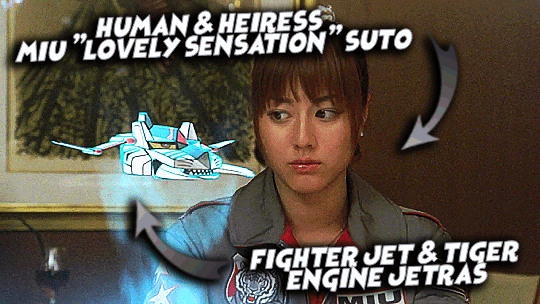


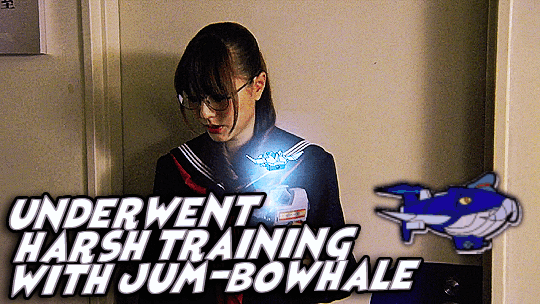
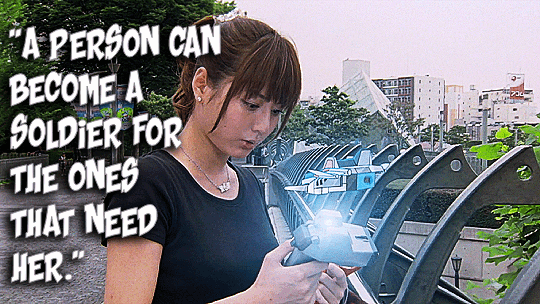

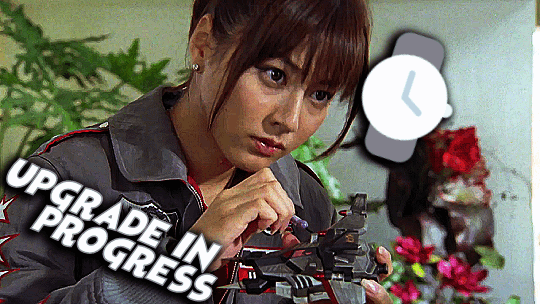


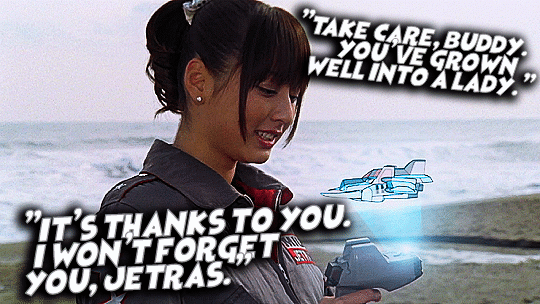
You're My Important Partner→Miu Sutō & Jetras
#engine sentai go-onger#engine sentai go onger#go-onger#go onger#super sentai fanart#miu suto#suto miu#jetras#go-on silver#go on silver#tokuedit#please do not repost#umbrella.edits#umbrella.posts#umbrella.gifs#translation for quotes: ga-earthly#only things with quotation marks are actual quotes#gifs.ymip
34 notes
·
View notes
Text
How to Write Dialogue
A lot of a story is told through narration: action, description, exposition, and so on. But a big part of characters interacting tends to be speech. In prose, we call this "dialogue."
The key to what happens in the scene for this is...
People communicate in their own way.
To a new customer entering their store, a gruff character might say "What do you want?" Whereas a more personable character might say "Welcome in! Can I help you?"
Maybe the character would use body language, with a wave as they speak. Or only use body language to communicate in this moment, with a polite nod and smile to the customer with no dialogue.
If they share some knowledge with character they are communicating with, they may speak differently, with an unspoken shared context for their conversation. Compared to speaking to a character who doesn't have that knowledge.

If both characters have the shared context of knowing Frank is coming for tea at 6, it would be odd if one said "Frank is coming for tea at 6." Because the person they are speaking to already knows that. (Unless they have some reason to believe they've forgotten.)
But it would be natural for one to say, "When was he coming, again?" or "I hope he doesn't start smoking like he did last time," without even declaring who they're talking about, or what the situation is. Just the new stuff. Just like people do in real life.
Think about why the character chooses to speak at this time, not before, not waiting until later? What do they want to communicate? How do they want to communicate it, how do they phrase it, what other things go along with it like tone, volume, body language as I mentioned earlier?
And of course, all of those things are affected by the character's personality, their mood and emotions in that moment, their relationship to the people they are communicating with, and the subject they are talking about.
A lot of times all of that just comes naturally from our understanding of the character, and we don't have to think through each of these one at a time. But if you're stuck, making it more of a "process" can help you get rolling.
And now, onto the mechanics of dialogue in the prose itself...

To mark text as being spoken instead of narration, it should start and end with double-quotes, "like this." There are novels that use single-quotes, but this is a rare exception and tends to be more common in older books. But if that's your thing, you do you.
Apparently, the UK flips this and starts with 'single-quotes'. I've lived in the UK all my life, and was taught to use double-quotes. So... I guess your mileage may vary, I don't know what that's all about... 😅
If a line of dialogue ends with a complete sentence, it will normally put the punctuation before the last quote. There are exceptions, and stylistic choices, but that's the general rule for dialogue.
"The sky isn't blue."
You can have quotations within the dialogue, marked with single-quotes. And, in theory, the further down the rabbit hole you go, it switches back and forth between single and double quotes.
So, a quote within dialogue has single-quotes. A quote within a quote within dialogue has single quotes again. And so on...
"And he said to me, 'Go over there and tell them, "Frank said, 'The sky is blue, darn it!'"'"
Yes this does look weird, and yes it can be confusing keeping track of the layers of quotation. Which is why it's very rare, in fiction at least. Instead of making a direct quote, a speaker normally paraphrased, or rewritten in other ways to simplify the structure of the dialogue.
"Frank said to tell you the sky is blue."
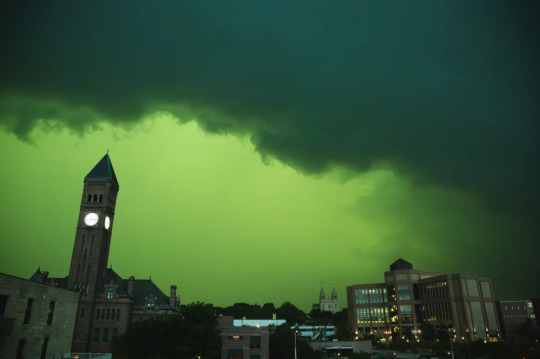
If the dialogue ends its own sentence, but the sentence as a whole continues with a dialogue tag, the full-stop/period at the end of the dialogue becomes a comma.
"The sky isn't blue," Geraldine said.
This is because a dialogue tag is actually part of the same sentence.
A dialogue tag is like a luggage tag tied to the end of the dialogue to tell us more about how it was said.
In the example above, there is a dialogue tag to tell us the character who said it: Geraldine.
You could write the dialogue tag in a couple of other ways:
"The sky isn't blue," said Geraldine.
Geraldine said, "The sky isn't blue."
But this is uncommon in modern novels, and makes it have a different old-timey vibe that may be confusing or distracting for readers. So bear that in mind if you want to try it out.

Now, if it's part of a longer piece of dialogue, you could leave it to the end of the spoken words to have the dialogue tag as normal. But the reader will be wondering through the whole thing... "Yeah, but who's even saying all this?"
To avoid this, try to have the indication of the speaker sooner rather than later. You can use any of the methods from this article to do so. But one example would be:
"Fourscore and seven years ago," Lincoln said, "our fathers brought forth, on this continent, a new nation, conceived in liberty, and dedicated to the proposition that all men are created equal..." (and so on)
For longer text like this, you can actually have paragraphs within the dialogue. The paragraph doesn't end in a quotation mark because the dialogue isn't ending. But then the new paragraph does have a quotation mark to remind the reader it's still dialogue.
"Four score and seven years ago, our fathers brought forth on this continent, a new nation, conceived in Liberty, and dedicated to the proposition that all men are created equal.
"Now we are engaged in a great civil war, testing whether that nation, or any nation so conceived and so dedicated, can long endure."
Again, confusing to read, and rarely needed or used in modern fiction. But something to know about. A better way would be to break up the dialogue with some "Blocking"--a stage term for people moving around the scene.
This would be a new paragraph, as it focuses on something else, and then another new paragraph continuing the dialogue. If we focus on a different character with the in-between paragraph, you might want to remind them who is speaking when they continue.
Lincoln stood for a moment, taking in the crowd. Then drew in a breath. "Four score and seven years ago, our fathers brought forth on this continent, a new nation, conceived in Liberty, and dedicated to the proposition that all men are created equal."
The crowd looked uneasy, a low murmur floating across them.
Lincoln shook his head. "Now we are engaged in a great civil war, testing whether that nation, or any nation so conceived and so dedicated, can long endure."

Going back to dialogue tags... Other verbs can be used instead of "said," to better describe how it was said.
"The sky isn't blue," Geraldine muttered.
There is a general tip that the same word shouldn't be used over and over in quick succession, because it draws attention to itself. But this doesn't apply to all words. Structural words like "a" and "the" shouldn't (and often couldn't) be replaced with a new synonym every time they're used.
This is because they simply fade into the background; the reader knows that they are common words and don't matter to the meaning of the sentence so much. So they just sort of brush over it. "Said" is one such word.
Don't be afraid of "said."
Some writers still try to not use "said" much, and instead use "thesaurus words"--synonyms with the same meaning--throughout their writing. However this actually draws more attention to it that using the simple "said," which people brush over anyway.
Take a look at the following examples:
"The sky isn't blue," Geraldine said.
"The sky isn't blue," Geraldine stated.
"The sky isn't blue," Geraldine explained.
Is "stated" describing how the line was said better than "said"? Not really. And is "explained" adding anything to the story that isn't from the dialogue? Nope.
If there is a line of dialogue, then it was said/stated/explained/said in reply/asked, depending on what was said and the context. We know what was said. So when a character asks something, the verb "asked" doesn't do anything that reading the question didn't do. So you may as well put "said."

"The sky isn't blue," Geraldine smirked.
"The sky isn't blue," Geraldine yawned.
And if you go too far with it, trying to incorporate an action into it, you can get yourself into a real mess. Smirking is not saying anything. You can smirk while saying something. But if the action you are performing is a smirk, or yawn, or laugh... you, my friend, have uttered no words!
These are known as "said-bookisms": words used to avoid writing "said." And named after a book that was written listing such words for writers to use (you may have seen similar posters/graphics on the internet). But as we don't need to avoid writing "said," we can safely throw out the book!
Earlier we used "muttered" instead of "said." Was that okay? Well, did that add to story? Does it tell the reader more about what was said? Yes! Now they know the words weren't simply spoken; they were said quietly, muttered under the breath.
Anything that tells us more about how the dialogue was said is fine. If the character shouted or screamed, or they muttered or mumbled, or slurred... they aren't necessarily obvious from the dialogue. So if they fit, and they describe the utterance of words, then go for it!
Sometimes writers have entire actions as a dialogue tag.
"The sky isn't blue," Geraldine moved over to the window, peering out.
That action isn't describing the act of saying that dialogue. So it doesn't make sense for it to be part of the same sentence. Just split it into its own sentence, and you should be good.
"The sky isn't blue." Geraldine moved over to the window, peering out.

However, these things may be indicated earlier in the paragraph, before the dialogue begins.
Geraldine looked up. "The sky isn't blue."
Because Geraldine has been established as the focus of this paragraph, any dialogue will be assumed to come from Geraldine.
Here, the first sentence describes an action the character took. But it could be a narrated thought. Or an expression. You can indicate the focus of the paragraph in many different ways, but however you do it, that can be used by the reader to infer who the speaker is.
You can of course add a dialogue tag anyway, using the pronoun of the character.
Geraldine looked up. "The sky isn't blue," she said.

The tone of the dialogue--the way it is said by the character--can also be implied by the context in the paragraph up to that point.
Geraldine laughed. "The sky isn't blue."
Geraldine gasped. "The sky isn't blue."
Whatever context the reader has before the dialogue will colour how they "hear" it in their minds as they read.
Geraldine whispered, staring up in awe. "The sky isn't blue."
Geraldine screamed. "The sky isn't blue!"
Geraldine staggered through the door, drunkenly. "The sky isn't blue."
In the last example, the character's general state or attitude is shown. So as you read what she says, you'll naturally imagine it being said differently. That's the beauty of writing...
The final story in the reader's mind is made from the teamwork between writer and reader.
You can actually get away with having no indication of the speaker at all, in particular circumstances.
Geraldine smiled, her nose wrinkling. "The sky isn't blue."
"I think you'll find it is, Gerry dear," Frank muttered, packing.
"No, no, you don't understand... the sky is not blue!"
"Poppycock."
"Look!"
Did you have any trouble knowing who was saying what? If not, why not? Because we had other context clues.
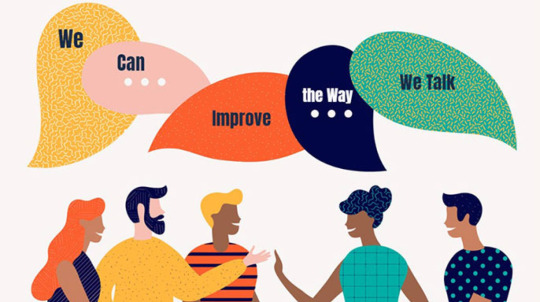
The first couple of lines had the speakers clearly declared. And, as they're the only two characters that are in the scene, it's natural that they'd each take turns--going back and forth in their conversation. Also, if this is in the middle of a book and you're used to how the characters talk differently, that can help too.
Just be careful to not rely on this back-and-forth effect for too long, because it will get confusing after a bit. Just pepper in something to remind the reader of whose turn it is--the character does something as they speak, or a simple dialogue tag is added. And the reader will keep up better.
16 notes
·
View notes
Text
Tenshiheisōban is the Title of Only the Head of House Shihōin
Setting aside for a moment what the title means literally, and what it refers to figuratively, I'm going to further clarify something.
I'm going to directly reject the assertion that Tenshiheisōban refers to House Shihōin, as stated by both Viz in the manga in chapter 154, and in Viz's official translation of CFYOW, and in fanlations of the same (listed below in order). They messed up. It's that simple.



No, this is Yoruichi's title. I can actually prove it to you definitively.

In chapter 159, we can see that the term is being applied directly and specifically to Yoruichi. Viz's own wording of "That is the Tenshiheisōban" (emphasis mine) shows it. They could have written, "That is one of the Tenshiheisōban" had it been the case it applied to House Shihōin. This is even clearer in the Japanese:
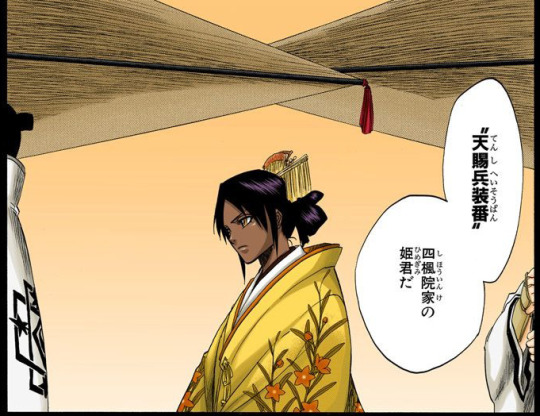
What's written here, verbatim, is:
〝天賜兵装番〟
四楓院家の姫君だ
That is to say, "'Tenshiheisōban'. She is the hime-gimi of House Shihōin." First, you should notice that Tenshiheisōban is always put in double quotation marks in the Japanese dialogue. When things are being quoted by characters in Bleach they usually use single hook quotation marks. This usage of double quotation marks is extremely unusual. This is normally done to refer to quotes in quotes, or to refer to book titles, or text heard through a phone. Obviously none of those applies here, and a book title is the closest analogy. This presentation draws a tremendous amount of attention to this term.
Furthermore, the following remarks make it clear it is attributable to Yoruichi and Yoruichi alone. If the term applied to the entire clan, this scene would be like pointing at a specific American soldier and saying, "United States Army" or pointing at an American and saying, "United States of America." That would be bizarre. But we can go further.
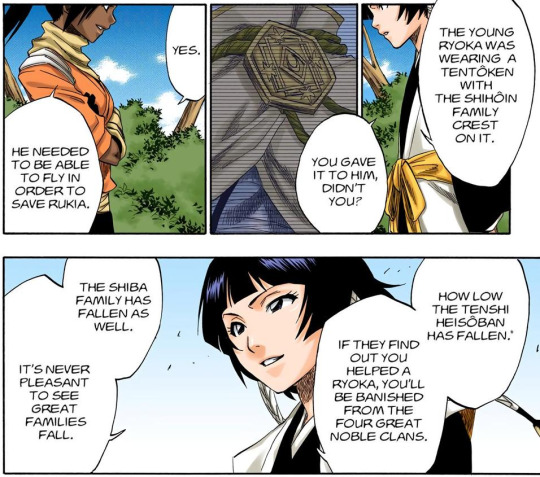
In chapter 154, Soifon is insulting Yoruichi... but this is where Viz really makes their mistake. The same evidence could be used here of saying this conversation is specifically directed at Yoruichi, but maybe you find contextual arguments weak. So let's look at this in Japanese too.
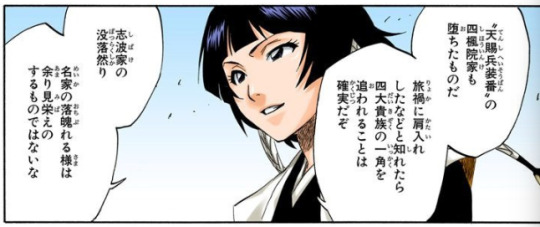
What's written here, verbatim, is:
〝天賜兵装番〟の
四楓院家も
堕ちたものだ
旅禍に肩入れ
したなどと知れたら
四大貴族の一角を
追われることは
確実だそ
志波家の
没落然り
名家の落皖れる様は
余り見栄えの
するものではないな
Soifon says a lot here, but the important part is 〝天賜兵装番〟の
四楓院家も堕ちたものだ, and the real core element of that is 〝天賜兵装番〟の四楓院家. The clause of possession here, の (of), is actually directing you to read this as, "House Shihōin of the 'Tenshiheisōban'", or "'Tenshiheisōban's' House Shihōin". It's possessive.
House Shihōin belongs to the Tenshiheisōban.
(For a more complete context, this sentence and the next read as to the effect of: "'Tenshiheisōban's' House Shihōin has also fallen, participating in this Ryoka misfortune. When they find out you did something like this, it's certain you'll be chased out of the Four Great Noble Houses.")
It's made explicitly clear in Japanese that House Shihōin are not collectively the Tenshiheisōban. Rather, an individual, the Tenshiheisōban, owns House Shihōin. And who is the only figure who can claim to own a noble house? The person leading that noble house.
It is therefore explicitly clear that the status of Tenshiheisōban must be broadly coterminal with the status of being the head of House Shihōin. They mean the same thing, and that is the official title of that role. It does not make sense to imagine Yoruichi has some extra title that supersedes head of house status, or that the role moves around between houses or whatever else.
Tenshiheisōban is the official title of the head of House Shihōin. It's put in double quotes because it's the true name of the title, rather than merely an allusion to it like 当主, tōshu, “head of the house”.
This is confirmed by the fact that Yūshirō has the title on his introduction chapter 606 of TYBW (thanks to an anon for pointing this out):
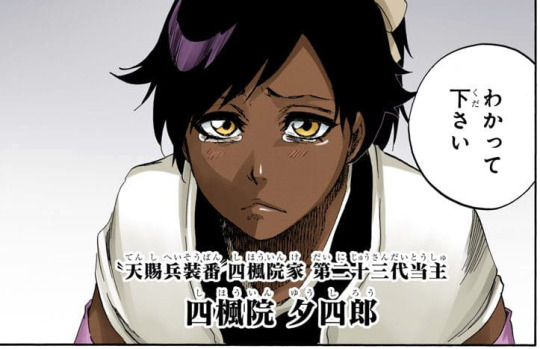

This leaves open the question of when he assumed it if Soifon was teasing Yoruichi with the title while being herself a Shihōin retainer some 22 months earlier; that wouldn't really make sense if he'd already held the position for several years. So presumably he picked it up during the time skip.
Now, why we only learn this official title for the Shihōin, and not for the Kuchiki, Shiba, or Tsunayashiro, I couldn't tell you. They must each have their own specific terms reflecting their specific duties or specialties. The Shihōin one does indeed reflect martial prowess. We know that the Tsunayashiro record and "control" history, we can make some guesses about the Kuchiki and Shiba, and we know the final unnamed house is involved with Hell. Each should therefore have a unique rank title.
Do all other nobles have unique rank titles too? Or are they generic below the rank of Shōichī? I don't know.
11 notes
·
View notes
Text
Tag game Get To Know Me (if you dare)
I'm not a scary person, I promise, don't worry hehe. Or am I? 👀
I was tagged by the lovely @lilmaemae , here goes babe 💜✨
Do you tidy your bed?
I do! Not always, but yes! Something about coming back to a tidy looking bed makes me more excited to jump into bed than if its untidy. (Though, I'm in bed a lot so, idk... you find the logic in this)
What's your favourite number?
Uhm, I don't have a favorite number? I guess I always like my age until I get to the point half way into the year where I'm like 'ohhh next year I turn xyz year old!' so maybe that's my favorite number? If so, right now it's 25
What is your job?
Right now I work in a grocery store. I have since I was sixteen, to earn my own money, and I never left.
If you could go back to school would you?
Yes. I quit my studies last year due to mental health, but I'd really like to go back and get my bachelor. Not the same studies tho, they changed it drastically when I got to my second year and it's t e r r i b l e now. Also one of the reasons that I quit!
Can you parallel park?
I can! Do I have my license? No.
A job you had that would surprise people
Uhm, well I've really only had the one job but, I've coached kids teams too within my sport?
Do you think aliens are real?
Yeah, I'm positive we're not the only ones out there. Even bacteria on a different planet are already alien.
Can you drive a manual car?
Yes. Again, do I have my license? No.
What's your guilty pleasure?
Uhm... I don't know?
Any phobias?
Spiders, the dark. I can walk at night just fine, but I cannot walk down the stairs into a dark hallway, past dark alley's and other dark space without being scared and having a fight or flight reaction :)
Tattoos
I have 8 tattoos! Mostly tiny ones.
I have:
- A quote: 'to the stars who listen and the dreams that are answered'
- My childhood dog's pawprint
- Quotation marks on my wrist over my veins as in to say 'life'
- A smiley
- A tiny heart
- A paper airplane I got when I was on (my first ever) vacation in Mallorca
- A silhouette of BossNoeul embracing each other (no faces tho cuz I'm not that crazy)
- And a quote that says 'freedom is the oxygen of the soul'
Favorite color?
Sunset orange and sky blue
Favourite type of music?
If I'm to believe my Spotify Wrapped it's mostly Pop, Indie, a little bit of Rock. Idk actually
Do you like puzzles?
No, they break my brain. Make me feel stupid.
Favorite childhood sport?
Korfbal, look it up. I still practice this.
Do you talk to yourself?
No.
Well, yes. Mostly when I do something stupid.
What movie(s) do you adore?
Marvel. Especially movies where the good guy turns bad due to trauma :)
But also feel good movies. They surprise surprise make me feel good.
Coffee or tea?
Tea! I don't drink coffee. At all.
First thing you wanted to be growing up?
A cashier because growing up my mom was a cashier at our local store.
aaaaa okay so that was me! Interesting questions tho!
Mutuals that I'll tag, don't feel forced to participate! But I'd like to get to know yall better <333
@chaeul @copperstown @misshanbb @paperzombie @misshprint @heerotheshiro
#tag game#get to know me#if you truly get to know me you'll see how unhinged i am#no just kidding im quite calm#also if ya have questions or ever just.... wanna talk... hit me up#i dont bite#not always#KIDDING
2 notes
·
View notes
Text
dunmesh spoilers rambling
its actually so clever but also crazy that marcille loses her desire to take care of her hair like brooo cuz throughout the series her various hairstyles are such a fun thing to look out for and at the very end its like oh. thats gone forever now... like Ok 🥲 but literally so clever and impactful cuz wow you'd never expect something like that to be something that can be "taken" from w character yknow
also just in general the ending is fucking crazyyy like its not super emphasized how fucked up it is but the fact that laios can never feel full again ever in his life is fucked up crazy. like that is torturous. yes he can keep on living but like O_O and also not being able to go near monsters again like very poetic and clever but also sad to a degree like thats his passion and love like... he meant this quote for real!!!

like he ate that fucking lion but in turn that lion ate the fuck out of him. yo wait

bro.... but also yeah he had to fucking KILL falin in order to "save" her. "save" in quotation marks bc i think falin is dead af (will make a post abt that later (hopefully) (inshallah)) but yeah he had to give up so much of himself to "save" falin like he ate so much and so much of himself was devoured like damn..
also since im rambling anyways since im a Tragic Siblings Enjoyer its crazy how tragic these siblings are! like they are unhealthily dependent on one another then one day laios just cuts her away and Leaves and its just sad and lonely falin eating meals by herself, but when she sees him again she goes with him despite there likely being a much better life for her if she stuck to her own path. but like thats her brother who she wants to go with she cant just let him go
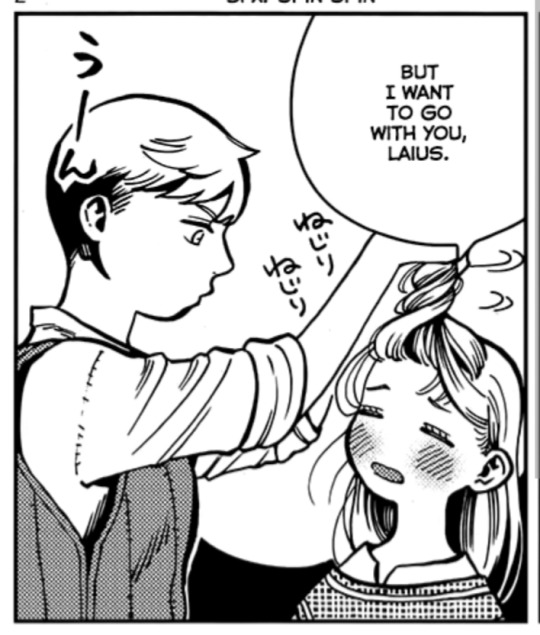
and then when one day she does the same to him and leaves him, and gets eaten, he finds that he cant let go of her anymore. after leaving the village and realizing he cant fit in anywhere outside of the village either, he realizes he'll actually do anything to get falin back. like for so long they only had each other.. also omg falin couldnt fit in anywhere outside of the village either. even tho she made it to magic school she was also ostracized there and only befriended marcille. oh marcille. shes the link between the two....
back to the siblings. but like yeah they only had each other and couldnt let the other one go, and it cost them so much like laios can never be satiated food-wise and also monster-wise, and falin is likely just a demonically made copy of herself and not even the real thing anymore, with a body thats been altered into a chimera.. like had they let either of themselves go at any point then it wouldnt have come to this. and how this echoes thistle who couldnt let the golden kingdom go and it ended up like That. their love is cannibalizing and monstrous. but also beautiful but also sad. like damnnnn
3 notes
·
View notes